-
Content Count
564 -
Joined
-
Last visited
Posts posted by Admin
-
-
After serving the NDP and the Canadian public in various capacities, Mr. Faisal Hassan, a prominent social activist and human rights advocate is seeking the NDP nomination for the next Federal election in Etobicoke North.
From housing activist to published author to broadcaster to political assistant, Faisal Hassan has a proven track record as a progressive activist in his community. He is a highly respected community leader who has dedicated his life to serving residents of diverse backgrounds.“I am thrilled to put forward my name for the federal nomination with the NDP and look forward to building strong and vibrant communities. Together, we will build on our strengths and successes while addressing the gaps in social and economic well- being to benefit all Canadians” says Faisal Hassan, who has long supported a progressive agenda and represents an experienced voice in his community.
Faisal Hassan says he is in the race because he strongly believes in the NDP. With strong roots in a riding he strongly believes in, Faisal is calling upon Etobicoke North residents to support his nomination stating that he is fully committed to addressing all issues affecting residents in the critically important Federal riding.
“It’s where I live, and it’s where I chose to live. It’s the community that has given me a lot, and I want to ensure the same opportunities exist for all residents of Etobicoke North. I believe in job creation, dealing with issues of income inequality, public transit, clean air and clean water. I know that with your help, together, we can build a better Etobicoke North “states Faisal Hassan.
Mr. Faisal Hassan (left) who is seeking the Federal NDP nomination for Etobicoke North has received the endorsement of Mr. Ed Philip (right), former NDP MPP (1975-1995) and a cabinet minister in the Bob Rae Government.Zakiya TafariFaisal currently works as an assistant to NDP MP, Mike Sullivan and as one of Canada's leading Somali to English literary translators. He has written a novel and formerly hosted a popular Somali-Canadian radio program. In addition, he served on the volunteer boards of the Centre for Equality Rights in Accommodation and Brampton's Habitat for Humanity. He is an active member of Unifor Local 232.
Etobicoke North is home to a large segment of population comprising of low-income families many of whom live in priority neighbourhoods. Faisal’s experience in this area will be critical as he has worked extensively with low-income persons and those who are at risk of homelessness. He was a driving force behind many initiatives that addressed the unmet needs of Toronto's homeless population through his work with the Toronto Community Housing Corporation, Housing Connections and as an Internal Review Panel member. He was also active with the Immigrant and Refugee Housing Task Group, which brings together representatives of different levels of government, academics, and community-based groups to share information, develop new strategies and advocate for positive change in housing policy.
A strong advocate for housing, Faisal's is well-known for his successes in getting the issues of homelessness, refugee housing and settlement addressed. He proposed the Red Cross First Contact Project which provides strategic intervention when and where new refugee claimants need it most – on arrival at a Canadian port of entry.
Patricia Crooks (left), the President of the Etobicoke NDP Riding Association has endorsed Faisal Hassan.Zakiya TafariIn political life, Faisal previously worked for former NDP MPP, Paul Ferreira and is formerly the President of the York South--Weston NDP.
Over the years, Faisal Hassan has tirelessly mobilized ongoing support for his community bringing their outstanding issues to the attention of the NDP. He has organized numerous community events that brought together residents, key stakeholders and policy makers in bid to find lasting and durable solutions to multitude of concerns raised by community members of diverse backgrounds and needs.
Some of the key events he helped organize include community round table forums that brought NDP leaders to come and listen to the public with view of working collaboratively with stakeholders to address critical issues affecting the community at large by employing effective implementation plans.Joan Bonk-MacKenzie, retired TCDSB teacher and former School Board Trustee (left) has endorsed Faisal Hassan of the NDP for the Federal Etobicoke North Riding.Zakiya TafariThe well attended party-sponsored round tables were aimed at engaging NDP leaders in group sessions with concerned residents that set forth their vision for tackling such critical issues as housing, unemployment, public transit and public safety concerns.
Faisal Hassan has secured high profile endorsements from key NDP personalities who heaped praise on the Etobicoke North candidate through statements released in promotional videos.
Ed Philip, former NDP MPP, from 1975-1995 and a cabinet minister in the Bob Rae government said “Faisal Hassan has a good knowledge of federal politics and would make us an excellent member of parliament” while Diana Andrews, a teacher and former NDP candidate in Etobicoke North noted that “Faisal Hassan gets things done, works hard and knows his community in Etobicoke North.”
Barry Marsh (right), an NDP Executive Committee Member, has endorsed Faisal Hassan.Zakiya Tafari“Faisal is a great candidate for Etobicoke North. He has been with York South- Weston for quite some time; it is a successful Riding Association and has done a great job. I think Faisal would be a great candidate for Etobicoke North because he knows the issues very well. He is for diversity, he is for change and we need change in Etobicoke North “said Patricia Crooks, the President of the Etobicoke North NDP Riding Association.
“I can’t think of a more fair- minded, interesting, caring person than Faisal Hassan. He would take your concerns to Ottawa and be available to you when you need” observed Joan Bonk-Mackenzie, a retired TCDSB teacher and former school board trustee.
Faisal Hassan has been endorsed by Diana Andrews (left), a teacher and former NDP candidate in Etobicoke North.Zakiya TafariCharan Hundal, an Etobicoke North NDP Provincial Council Delegate stated “I strongly endorse Mr. Faisal Hassan as our Federal candidate for Etobicoke North” while Barry Marsh, an Etobicoke North NDP Executive Committee Member said “Faisal has been very active in York South-Weston Riding and has done a lot of work in Etobicoke North.”
A proud resident of Etobicoke North, Faisal Hassan was educated at the University of Winnipeg where he earned a Bachelor's degree in Justice, Law Enforcement and Administrative studies. He also holds a Certificate in Project Management from Humber College. If nominated, Faisal Hassan will undoubtedly be a strong candidate for his party and an extremely powerful and influential voice for his community.For more info, please visit Faisal Hassan’s official campaign website at:http://faisalhassan.caFaisal Hassan (centre) has received the endorsements of Patricia Crooks (left), the President of the Etobicoke North NDP Riding Association and Barry Marsh (right), Etobicoke North NDP Executive Committee Member.Source: http://www.digitaljournal.com/ -
The self-declared state of Somaliland has ambitious plans to regulate its nascent oil sector. However, it is a step that could heighten tensions throughout the Somali-speaking region.
Like other East African states such as Tanzania and Kenya with lucrative new oil discoveries, Somaliland is developing resources laws in preparation to reap the benefits of expected – although as yet unconfirmed – petroleum deposits.
But analysts warn that access to oil could bring the question of autonomy from the internationally recognised state of Somalia to a head. Though technically still part of Somalia, Somaliland has existed as an unofficial state since unilaterally declaring independence in 1991.
The question of autonomy remains charged, although an uneasy status quo and Somalia’s weak central government have allowed Somaliland to operate more or less independently for over two decades. Access to oil finds, however, could shift the calculus of the official Somali government in Mogadishu in favor of quashing the autonomy claim for good.
Internal expectations could also destabilise Somaliland, an oasis of relative calm since 1993 within the fractious Somali ethnic triangle that includes Ethiopia and Kenya.
Both countries have large populations of ethnic Somalis, with whom the state has fraught relations. Ethiopia stands accused of human rights abuses against its restive Somali citizens in the eastern Ogaden region, while Kenya is trying to stamp out a fresh wave of attacks by the Somalia-based terrorist group Al Shabab.
Copies of three June 2014 draft bills seen by the writer address petroleum regulation and revenue allocation in Somaliland. They show that Hargeisa, Somaliland’s unofficial capital, is planning to establish a sovereign wealth fund, and has firmly rejected using Somaliland petroleum to subsidise fuel for its citizenry. The bills, designed by Norwegian law firm Simonsen Vogt Wiig, are still being held within the energy ministry and have not been presented to Cabinet yet.
The reaction of the internationally recognised state of Somalia to Somaliland’s efforts towards developing its own petroleum legislation has been muted so far, largely due to infighting that has paralysed the government in Mogadishu for months.
Instead, Mogadishu has ramped up development of a parallel oil sector, and has aimed its threats at oil companies.
The Federal Government of Somalia (FGS) in Mogadishu has made it clear it considers contracts signed with Somaliland void.
In September, it said companies that signed deals with regional governments were “adding fire to conflicts” and “destroying the international community’s effort to build the peace and the security of the country”.
It singled out Norwegian oil explorer DNO International, which signed a production sharing agreement with Somaliland in April 2013, and threatened to lodge a complaint with the United Nations Security Council.
Somalia expects to finish a seismic study of the country by the end of this year, in order to start a licensing round next year. The FSG hopes to be producing hydrocarbons offshore by 2020 from a total national reserve that’s estimated to be as high as 110 billion barrels of oil – a figure equivalent to Kuwaiti oil reserves.
The FGS is also talking to oil companies about reviving concessions abandoned under force majeure in 1991, when the country disintegrated into civil war following the ouster of dictator Siad Barre.
However, Africa Oil’s thwarted attempts to explore a concession partially in Somaliland, yet awarded by the Puntland government, indicate the challenges Mogadishu faces if it wishes to enforce Chevron’s or ConocoPhilips’ old concessions granted in the same area.
“Somaliland has already concessioned out those areas…If Mogadishu moves actively to grant a concession, a new concession, in territory that is in Somaliland – that will be a really robust signal from them of intent,” Chatham House fellow Jason Mosely explains.
In October, the UN Monitoring Group on Somalia and Eritrea warned of security risks from rival claims over oil licences, unless the competing authorities create a joint approach to resources management.
Yet Somaliland’s foreign minister Mohamed Bihi claimed in a July interview with the author that oil had not come up in the Turkey-sponsored talks between Somalia and Somaliland, indicating that dialogue between the two countries on the issue could be moving more slowly than developments on the ground.
Internal frictions
If oil management is being marked as a source of future conflict between regional Somali authorities, several internal controversies already flaring within Somaliland indicate how divisive the topic could be on a larger scale.
Public opposition to a perceived lack of transparency and participation in Somaliland’s oil sector is building as disputes over land use, alleged oil payments and local employment have tainted the sector since its inception two years ago.
In 2013, Anglo-Turkish explorer Genel Energy suspended its operations citing security concerns, after problems with a local community escalated.
Oil is also feeding the cause of separatist a movement Khaatumo state. The group claims territory in Somaliland and Ethiopia and is agitating to become an autonomous state under the FGS, and sees the oil blocks within its territory as potential bargaining chips.
According to Mr Mosely, although the movement’s roots precede Somaliland’s oil finds “it would be accurate to say that oil certainly did not make anything any easier”.
From the perspective of the separatists, Hargeisa’s lack of grassroots consultation on oil exploration deals is compounding a view that the distant capital has no right to claim the region’s resources wealth, let alone govern over Khaatumo-claimed land.
And the Somaliland government’s refusal to submit the four already-signed production sharing agreements for Parliamentary approval is exacerbating friction with the legislature.
“In the absence of transparency, alternative scenarios come into being and anyone who fails to be transparent is obviously hiding something,” Ibrahim Jama, an MP from the eastern Sanaag region, says.
He claims the constitution requires all international agreements to be scrutinised by Parliament, a detail energy minister Hussein Abdi Dualeh disagrees with. Mr Dualeh claims responsibility for resources is vested in the state, so it is up to the government to decide how to manage them.
“We do not want to have a food fight over who owns what,” he says.
Aggravating these problems will be the Somaliland government’s limited ability to implement the ambitious laws it has drafted. The possible outcome could be continuing public disputes between separatists, diaspora activists and the government, and the growing mistrust of grassroots communities residing in Somaliland’s oil rich eastern territories.
Dominik Balthazar, a fellow at the United States Institute for Peace (USIP), doubts whether Somaliland has the bureaucratic capacity to implement the proposals, or the economic size to resist over-focusing on hydrocarbons, causing other sectors to wither.
“It is not necessarily the question of whether Somaliland can establish such institutions, it has proven in the past that it can,” he says.”[but it is] currently not in the best of positions to bear the political and economic shocks the commercial production of hydrocarbons is likely to be accompanied with.”
Oil finds have heightened the stakes in the Somali region, with possible destabilising consequences if the issue is not addressed head on. Mr Mosely argues that Somaliland and the government in Mogadishu must cut a deal not only to clarify basics like concession ownership, but to prevent violent clashes between regional authorities and private actors.
“Eventually you have got to deal with the fact that none of the entities…are really competent jurisdictions to grant concessions in an international sense,” he says.
“Somaliland does not exist, internationally… and [the government in Mogadishu] is the sovereign entity for which responsibility to grant these concessions, in international law terms, rests.”
By Rachel Williamson on December 18, 2014
-

Local Somali leader Abdi Bihi tells Fox 9 a community elder contacted him to share concerns about Sprint ads being mailed to Minneapolis residences.
The ads show a variety of weapons -- a machete, butcher knife, chainsaw, and sword, among others -- and ask, "Wanna cut your monthly Verizon or AT&T bill in half?"The mailers clearly aren't meant to be threatening, but Bihi says that's exactly how Somalis who lack English skills and see their names and addresses printed on them feel."There's a tremendous amount of cultural language barrier," Bihi says. "I was called by one of the businessmen in the community who has a business at [Karmel Square], and he had to meet with elders who were complaining about this. They were hysterical, thought they were being threatened."Bihi said the elder he spoke with wanted him to share the concerns he and other Somalis have about the mailers with the media.Asked who the Somali elders think would be threatening them, Bihi says, "They don't know who, maybe there are some bad people out to murder us, because some... All they can read are the pictures and their names and addresses, and because of the background they came from they just assume someone is out to get them."Sprint officials didn't immediately return emails and a voicemail seeking comment.Sprint responds to Somali concerns about ad campaign
A local Somali leader told Fox 9 community elders are "hysterical" and feel threatened by Sprint ads sent to their homes featuring images of a number of weapons."There's a tremendous amount of cultural language barrier," Abdi Bihi says.Last night, Sprint spokesman Dave Mellin responded with the following statement:This is the first voice of concern that we have heard to date about this campaign. We certainly take all perspectives seriously and will be monitoring this closely to see if others voice a similar concern. In today's advertising environment, we have to continually be innovative and bold to get viewers' attention. We certainly apologize to anyone who may have been offended.Mellin says the ads are part of a national campaign.Source: http://www.myfoxtwincities.com
http://www.somaliaonline.com/somali-community-elders-become-hysterical-after-sprint-sends-threatening-ads-featuring-images-of-a-number-of-weapons/ -
This is the woman outside TK Maxx tonight
Until Wandsworth Council decided it was in their best interests to remove it
The family used to live on the bench
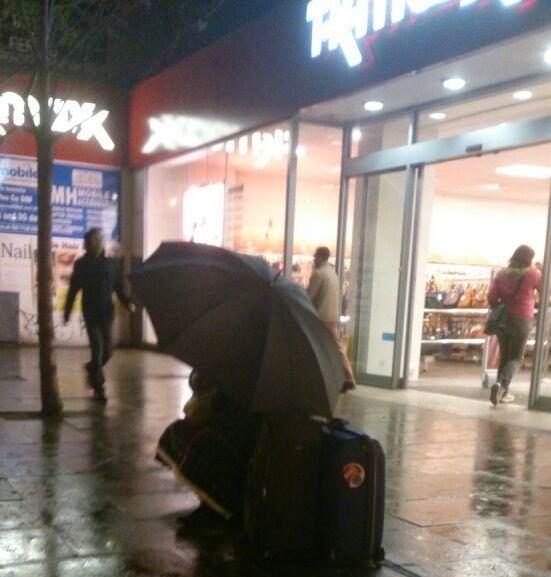
Emergency services were called to the bench on Monday and the Somali woman was hospitalised after suffering from cold.
The next day the bench was removed when Wandsworth Council decided it was in the best interest of the family who had made the bench their home.
Then just after 3pm today the woman, thought to be in her 60s, returned to the bench to find it is no longer there.
Reporter Ellie Cambridge went to visit the woman tonight and offered her fruit and biscuits. However, the offer was rebuffed.
The woman is now huddled up on a chair, using an umbrella to shelter her from the rain.
She is wrapped up in blankets, alone, on the exact spot where the bench once stood.
Residents expressed their shock at the bench's removal, with many criticising it as a short-term solution to the family’s problems.
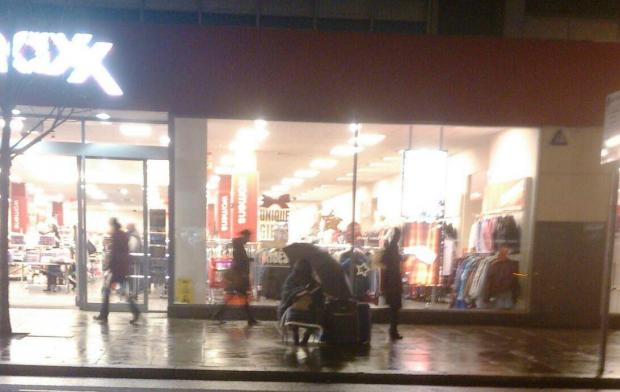
The mother and son centred their lives around the public bench outside TK Maxx, in Tooting High Street.
It is understood the woman's son is in hospital.
All the fruit and biscuits went to a homeless man who sits under the railway bridge in Balham.
Source: http://www.wandsworthguardian.co.uk
-
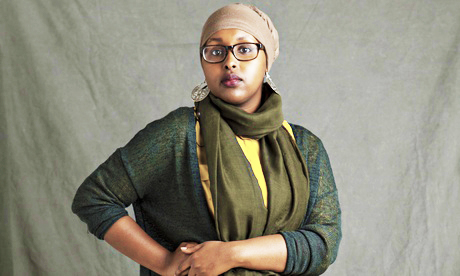 There aren’t many teenagers who can say they told the prime minister to “grow a pair” on Newsnight, and got what they wanted as a result. Now 21, campaigner Muna Hassan cringes as she remembers it, shrinking in her cafe seat. “My mum was like: ‘You told David Cameron what?’” Hassan was subsequently grounded – but it was the attention-grabbing moment her campaign needed. “If that comment got people talking aboutFGM [female genital mutilation] then I really don’t mind, because people who never knew about it are reading up on it now.”Born in Sweden to Somali parents, Hassan and her family migrated to England when she was eight, settling in Bristol. It was there that she first heard about FGM, aged 13, through local charity Integrate. Doing her own research, she was shocked to discover that the practice was rife in Somalia. “The next day, me and three other girls decided we had to do something. There’s this openness now around FGM, but when we started campaigning, everyone was just like: [she pulls a face of disgust and waves her hands] ‘We don’t wanna know.’”This has been a pivotal year for getting FGM on the political agenda in Britain. Although the practice, most prevalent in African and Middle Eastern communities, has been outlawed in the UK since the 1980s, FGM has continued to occur, with British ministers ignoring the issue for fear of being deemed culturally insensitive or racist. As Hassan and other campaigners have argued for years, however, FGM is a form of child abuse – race shouldn’t come into it. It was only in March this year that the first prosecutions came about.In February, Hassan and five others from Integrate (including Fahma Mohamed, the face of the campaign) took a Guardian-backed petition with over 230,000 signatures to the then education secretary Michael Gove, calling for him to remind schools of their duty to teach the risks of FGM. “It was hilariously awkward for all of us because he was just souncomfortable discussing anything relating to women’s private parts,” Hassan says, laughing at the memory. “One of the girls mentioned vaginas and he went really red!”How did it feel when he agreed to write to every school in England? “We thought – sending a letter out to all schools, that’s great, but how many will act upon it? As a minister, there’s still so much he could do. It would have been great if he’d agreed to do training for all frontline staff – if all teachers knew to look out for signs of FGM, they could deal with it. Plus, education about FGM has to happen from a young age. That’s our biggest focus now.”Alongside the petition, presenting at the Department for International Development-hosted Girl Summit in July and the launch of Girl Generation (an African-led anti-FGM movement) in October, Hassan recalls another highlight of her year: “Meeting Malala [Yousafzai, Pakistani schoolgirl turned education activist who won the Nobel peace prize]. That was mind-blowing. I got a call on a Sunday morning saying ‘Get ready, we’ll be at yours in 30 minutes – you’re going to meet Malala,’ and I thought, ‘Am I dreaming?!’” Was she starstruck? “I thought I was going to be, but she’s so natural, and very teenager-y; you forget that she’s an internationally acclaimed activist when you’re with her because she seems so normal and jokes around.” Not unlike Hassan then, whose frequent hand-over-mouth schoolgirl giggling is completely incongruous with her powerfully articulate, no-nonsense approach to discussing gender-based violence.We meet in a cafe in central London, near to where Hassan is currently living with her aunt while studying for a degree in child development. Hassan still does a lot of work with Integrate, and is looking forward to their conference in Bristol in February next year. “We’ve invited Nicky Morgan [Gove’s successor], who we hope sees FGM like we do – as part of gender-based violence. There’ll be different workshops the entire day about how to teach issues around FGM.”Talking about the future, Hassan seems optimistic; the naysayers who slowed FGM campaigning a few years ago are now few and far between. “Now if someone says anything [negative] about [our work] it’s more funny than anything. When it’s a man, we’re like: ‘Why are you getting so defensive about vaginas?’” She smiles knowingly. “As soon as you say that, they shut up.”Source: http://www.theguardian.com
There aren’t many teenagers who can say they told the prime minister to “grow a pair” on Newsnight, and got what they wanted as a result. Now 21, campaigner Muna Hassan cringes as she remembers it, shrinking in her cafe seat. “My mum was like: ‘You told David Cameron what?’” Hassan was subsequently grounded – but it was the attention-grabbing moment her campaign needed. “If that comment got people talking aboutFGM [female genital mutilation] then I really don’t mind, because people who never knew about it are reading up on it now.”Born in Sweden to Somali parents, Hassan and her family migrated to England when she was eight, settling in Bristol. It was there that she first heard about FGM, aged 13, through local charity Integrate. Doing her own research, she was shocked to discover that the practice was rife in Somalia. “The next day, me and three other girls decided we had to do something. There’s this openness now around FGM, but when we started campaigning, everyone was just like: [she pulls a face of disgust and waves her hands] ‘We don’t wanna know.’”This has been a pivotal year for getting FGM on the political agenda in Britain. Although the practice, most prevalent in African and Middle Eastern communities, has been outlawed in the UK since the 1980s, FGM has continued to occur, with British ministers ignoring the issue for fear of being deemed culturally insensitive or racist. As Hassan and other campaigners have argued for years, however, FGM is a form of child abuse – race shouldn’t come into it. It was only in March this year that the first prosecutions came about.In February, Hassan and five others from Integrate (including Fahma Mohamed, the face of the campaign) took a Guardian-backed petition with over 230,000 signatures to the then education secretary Michael Gove, calling for him to remind schools of their duty to teach the risks of FGM. “It was hilariously awkward for all of us because he was just souncomfortable discussing anything relating to women’s private parts,” Hassan says, laughing at the memory. “One of the girls mentioned vaginas and he went really red!”How did it feel when he agreed to write to every school in England? “We thought – sending a letter out to all schools, that’s great, but how many will act upon it? As a minister, there’s still so much he could do. It would have been great if he’d agreed to do training for all frontline staff – if all teachers knew to look out for signs of FGM, they could deal with it. Plus, education about FGM has to happen from a young age. That’s our biggest focus now.”Alongside the petition, presenting at the Department for International Development-hosted Girl Summit in July and the launch of Girl Generation (an African-led anti-FGM movement) in October, Hassan recalls another highlight of her year: “Meeting Malala [Yousafzai, Pakistani schoolgirl turned education activist who won the Nobel peace prize]. That was mind-blowing. I got a call on a Sunday morning saying ‘Get ready, we’ll be at yours in 30 minutes – you’re going to meet Malala,’ and I thought, ‘Am I dreaming?!’” Was she starstruck? “I thought I was going to be, but she’s so natural, and very teenager-y; you forget that she’s an internationally acclaimed activist when you’re with her because she seems so normal and jokes around.” Not unlike Hassan then, whose frequent hand-over-mouth schoolgirl giggling is completely incongruous with her powerfully articulate, no-nonsense approach to discussing gender-based violence.We meet in a cafe in central London, near to where Hassan is currently living with her aunt while studying for a degree in child development. Hassan still does a lot of work with Integrate, and is looking forward to their conference in Bristol in February next year. “We’ve invited Nicky Morgan [Gove’s successor], who we hope sees FGM like we do – as part of gender-based violence. There’ll be different workshops the entire day about how to teach issues around FGM.”Talking about the future, Hassan seems optimistic; the naysayers who slowed FGM campaigning a few years ago are now few and far between. “Now if someone says anything [negative] about [our work] it’s more funny than anything. When it’s a man, we’re like: ‘Why are you getting so defensive about vaginas?’” She smiles knowingly. “As soon as you say that, they shut up.”Source: http://www.theguardian.com -
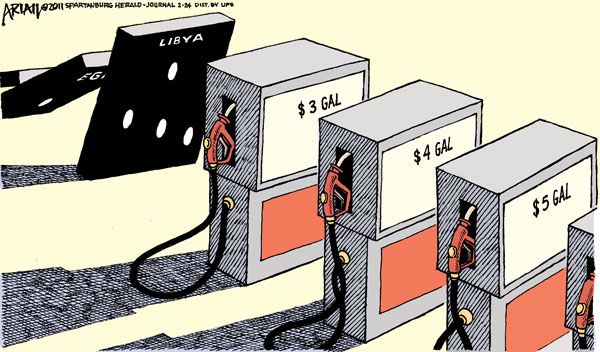
“We see everything as this or that, plus or minus, on or off, black or white; and we fragment reality into an endless of either-ors. In a phrase we think the world apart” – Parker Palmer
Though in many social, professional, and academic circles, thesensationalized construct of Western and Islamic civilizational divide is steadily proven futile, in many policy circles and chambers of power it is perceived as perpetual dichotomy that could only be reconciled by blood and gore.
In that latter outlook, terrorism and counter-terrorism matter, while their causes and effects don’t. This dangerous fear-based viewpoint confines the human capacity to imagine better alternatives and strategize for mutual interest.
There are some pseudo-religious desperadoes, or violent extremists, among Muslims who give credence to the “they are out to get us” mendacity. By the same token, there are extremist hawks in the West who hide behind policies and institutions, who, in their hegemonic military-based imposition, give credence to the grievances often wielded by the likes of ISIS, al-Qaida, and al-Shabaab.
Unfortunately, these two groups have profound influence in how Islam and Muslims are ultimately defined and indeed perceived.
Through the Prism of Professional Bias
Routinely, the Western media projects the news as a hopeless saga of perpetual conflict and random acts of violent extremism that need no informed context to enable consumers to decipher and understand what is at issue or who is at fault. Within that subjective framework, Islam is often mischaracterized and demonized.
So, if ever you felt as though you were suffocating from thick pervasive smoke emanating from the wildfires raging deep inside a global political forest, you are not alone.
There are many conflicts around the world that active Muslims of various political views or interests are part of. These Muslims are referred to as Islamists — practicing Muslims with social, political and economic viewpoints.
A number of countries in the West and various other nations — including Muslim ones — have embraced the relentless demonization propaganda that routinely frame Islamists (violent and the non-violent) as not only as religiously-inspired villains, but as ticking bombs ready to explode in due course. This conviction has declared an open season on Islamists in ways that no other faith-inspired individuals and groups have experienced in contemporary history.
Though the sadistic CIA torture program made public by the U.S. Senate has been dominating the headlines, much worse crimes against humanity were committed against unarmed civilians by Egypt’s coup regime.
Ironically, beyond anyone’s expectation, UAE has designated 83 Muslim organizations — including prominent ones that are based and operate in the West — as terrorist organizations. Especially interesting about UAE terrorist list is that notorious violent extremist organizations such as al-Qaida and ISIS made number 14 and 17 in the list. Almost all top spots were reserved for non-violent organizations believed or are affiliated with the Muslim Brotherhood.
Since the Arab Spring of 2011 a number of political actors in Egypt, Tunisia, Libya, Syria and Yemen were believed either associated or inspired by the Muslim Brotherhood — an organization that promoted social, economic and political empowerment by way of democratic participation. The vast popularity of their model, including their strategic vision to reform the old order, their capacity to mobilize, and their technocratic aptitude, has sent shockwaves throughout the region.
Monarchies and emirates in the region have taken notes.
The Perfect Storm
What are the internal and external factors contributing to the flippant vilification of Islam and Muslims?
The intersection of three particular phenomena has exacerbated an already volatile situation. First, the assertive impatience of Muslim youth toward the post-colonial autocratic rulers installed to perpetuate exploitation. Second, the unveiling of global financial scams that almost collapsed the fragile Western banking system, thus triggering serious repercussions throughout the global financial system. And third, the projection of the imminent depletion of food, water and energy-related resources.
Today, one cannot ignore the fact that many Muslim countries are in existential turmoil. And anyone who connects these dots could easily find irrefutable evidence that they all have one thing in common – they are either rich in natural resources or have strategic geographical importance. The veteran British journalist, Robert Fisk, captured this reality very convincingly when he said: “If the major export of Iraq was asparagus, do you believe the 82nd Airborne would be in Mosul or the 3rd Infantry Division would be in Bagdad?”
Politics of Demographics
According to U.N. demographic projection, by the middle of this century the world population will reach as high as 9.5 billion. Most of this dramatic growth will be in Asia and Africa. The current world population is 7 billion. This means one in every five people is a Muslim. By mid-century, this ratio is projected to improve to one in every three of the world population to be a Muslim. This means 3.5 billion Muslims. However, should the current trend continue, this dramatic numerical increase is likely to come at a time when Islam is still set on auto pilot, aimlessly wandering between a hostile and desolate ideological plain.
In a study titled “The Muslim World After 9/11,” the RAND Corporation had the following policy recommendations in order to render issues such as the military occupation of Iraq and Afghanistan futile and to offer options away from radicalization. Their recommendations included providing “moderate Muslims”—a phrase wholly abused by the neocons—platforms. Moreover, they recommend creating civil society institutions, and engaging “Islamists to participate in the political process, and strengthen relations with the military in Muslim nations.” Lastly, RAND recommended creating “economic opportunities in Muslim nations, particularly for young people…”
Over a decade later, it has become clear that so long as U.S. troops are present in the Islamic world and U.S. government continues its blind support of Israeli expansionist policy and systematic genocide of the Palestinian people, groups such as ISIS and al-Qaida would have reasons to exist.
Secularism and Political Islam
Political Islam still remains a loaded term that brings to mind other concepts and terms that are equally misunderstood (shariah, jihad, etc.) as such is seldom discussed rationally, though modernity prescribes “reason” as the commodity of human relations. One would be hard pressed to find a few well-reasoned debates that compare and contrast the merits and demerits of political Islam in the marketplace of ideas.
Had that been done, many would’ve realized that there is no one particular doctrine driving political Islam.
Meanwhile, by design or otherwise, there is wide consensus in certain circles to torpedo any government around the world that is led by independent-minded Islamists. Little over a year ago, the AK Party of Turkey and the Freedom and Justice Party of Egypt — two governments in two nations with historical capital and political clout — came under barrage of international and local media attacks; the former survived for now whereas the latter only had one year before it was overthrown by military.
Unity in Diversity
Contrary to common misconception, Muslims are neither homogeneous nor are their interpretation and implementation of the Qur’an and the teachings of Prophet Muhammad monolithic. Aside from the belief in the oneness of God and the prophethood of Muhammad, there isn’t a whole lot that Muslims are united on. And such seemingly extraordinary reality is profoundly consistent with the prophecy of Prophet Muhammad which proclaimed that Muslims would, in due course, have more denominations than Jews and Christians.
Around the world flames of war are sporadically burning, wars of greed, privilege, domination and dogma. Generally speaking, we have embarked on a dangerous locomotive destined to the triangle of paradox: enlightened groupthink, dysfunctional order and never-lasting peace!
Before we can save anything or anyone, we must first figure out a safe way of disembarking and find a safe space conducive for clear thinking.
Whether operating in Iraq, Afghanistan, Somalia or Kenya, the
Their ways, often facilitated by draconian decrees or repressive policies that condone torture and extrajudicial killings, often prove free exercise of sadistic powers that only result in more radicalization and perpetual hate.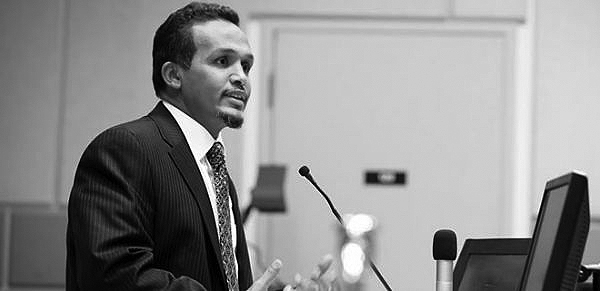 Abukar Arman is a former diplomat (Somalia’s Special Envoy to the US). He is a widely published political analyst. His focus is post-civil war Somalia, extremism, Islam, and US foreign policy. He is a DiploAct of a sort (fusion of diplomacy & activism).
Abukar Arman is a former diplomat (Somalia’s Special Envoy to the US). He is a widely published political analyst. His focus is post-civil war Somalia, extremism, Islam, and US foreign policy. He is a DiploAct of a sort (fusion of diplomacy & activism).You may follow him on Twitter: @AbukarArman or reach him via e-mail:abukar_arman@yahoo.com
-
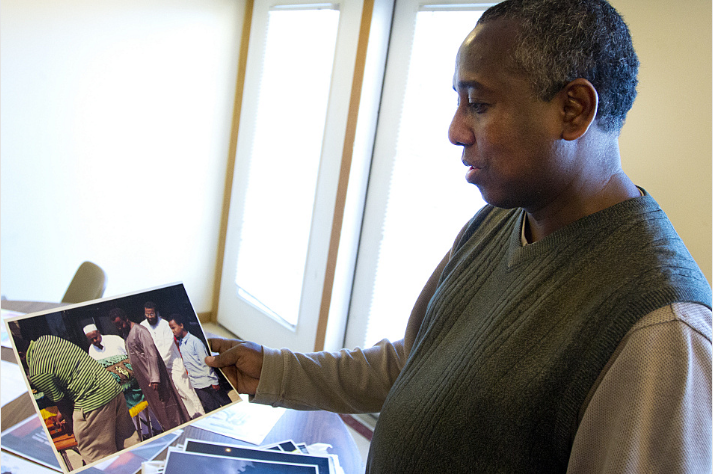 For years, Mohamed Barre has been taking photographs of the Twin Cities Somali community. The Somali refugee's goal is to create an archive of immigrant life to share will his American-born children. Nikki Tundel / MPR NewsYears ago, Mohamed Barre began snapping pictures of Somali life in Minnesota just so his kids could see what it was like for the first refugees.But as he photographed everything from mosques to halal markets, Barre found he'd built a rich archive of Somali-American life for everyone. What began as an amateur photographer's tinkering grew into art.On Saturday, he'll host an exhibit of his images at Bottineau Commons in Minneapolis. Barre, 50, describes the photos as "a good excuse" to get Somalis and non-Somalis together."I want everyone to get to know my community as well as their neighbors, to know more who they are and ask questions that you somehow cannot ask at the playground, at the bus," he said recently as he watched his children run around the soccer fields near their northeast Minneapolis apartment building. "You can come and ask me any question that relates about the community."Barre came to the United States as a refugee in 1995. He lived in Virginia then moved to Minnesota in 1998. He met his wife, Naema Ali, also a Somali refugee, when they were both in college at St. Mary's University in Minneapolis. Their six kids, ages 9 to 13, were all born in Minnesota.
For years, Mohamed Barre has been taking photographs of the Twin Cities Somali community. The Somali refugee's goal is to create an archive of immigrant life to share will his American-born children. Nikki Tundel / MPR NewsYears ago, Mohamed Barre began snapping pictures of Somali life in Minnesota just so his kids could see what it was like for the first refugees.But as he photographed everything from mosques to halal markets, Barre found he'd built a rich archive of Somali-American life for everyone. What began as an amateur photographer's tinkering grew into art.On Saturday, he'll host an exhibit of his images at Bottineau Commons in Minneapolis. Barre, 50, describes the photos as "a good excuse" to get Somalis and non-Somalis together."I want everyone to get to know my community as well as their neighbors, to know more who they are and ask questions that you somehow cannot ask at the playground, at the bus," he said recently as he watched his children run around the soccer fields near their northeast Minneapolis apartment building. "You can come and ask me any question that relates about the community."Barre came to the United States as a refugee in 1995. He lived in Virginia then moved to Minnesota in 1998. He met his wife, Naema Ali, also a Somali refugee, when they were both in college at St. Mary's University in Minneapolis. Their six kids, ages 9 to 13, were all born in Minnesota.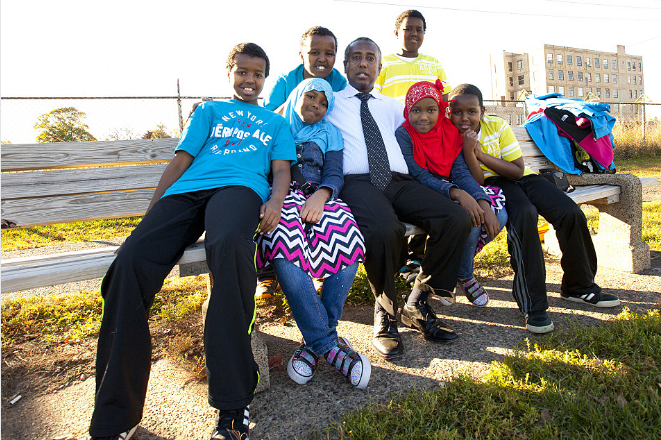 Mohamed Barre and his children pose for a photo on October 15, 2014, in Minneapolis, Minnesota. Pictured (from left to right) are Ilias, age 12, Ilhan, age 9, Issa , age 11, Barre, Ilham, age 9, Ismael, age 13, and Ishaq, age 10. Nikki Tundel / MPR NewsIt's important for the younger generation to know the way things were for people who fled war-torn Somalia, Barre said. But while some Somali refugees focus on returning to a renewed Somalia, Barre says that's the last thing on his mind."We are raising children that were born here. Few of them will ever go back," said Barre, a child-support officer at the Hennepin County Department of Health and Human Services. Immersing them completely in American life will let them "integrate and understand this is their country."That doesn't mean he wants his children completely disconnected from their heritage. When asked, they can rattle off facts about Somalia, their parents' homeland."They have dangerous animals, like hyenas and lions," says 10-year-old Ishaq."A lot of beaches and mango trees," Issa, who's 11, chimes in.The children are more comfortable, though, with knock-knock jokes and NFL scores. Occasionally they burst into random pop culture refrains, like when they sing the theme from the "Cops" TV show.
Mohamed Barre and his children pose for a photo on October 15, 2014, in Minneapolis, Minnesota. Pictured (from left to right) are Ilias, age 12, Ilhan, age 9, Issa , age 11, Barre, Ilham, age 9, Ismael, age 13, and Ishaq, age 10. Nikki Tundel / MPR NewsIt's important for the younger generation to know the way things were for people who fled war-torn Somalia, Barre said. But while some Somali refugees focus on returning to a renewed Somalia, Barre says that's the last thing on his mind."We are raising children that were born here. Few of them will ever go back," said Barre, a child-support officer at the Hennepin County Department of Health and Human Services. Immersing them completely in American life will let them "integrate and understand this is their country."That doesn't mean he wants his children completely disconnected from their heritage. When asked, they can rattle off facts about Somalia, their parents' homeland."They have dangerous animals, like hyenas and lions," says 10-year-old Ishaq."A lot of beaches and mango trees," Issa, who's 11, chimes in.The children are more comfortable, though, with knock-knock jokes and NFL scores. Occasionally they burst into random pop culture refrains, like when they sing the theme from the "Cops" TV show.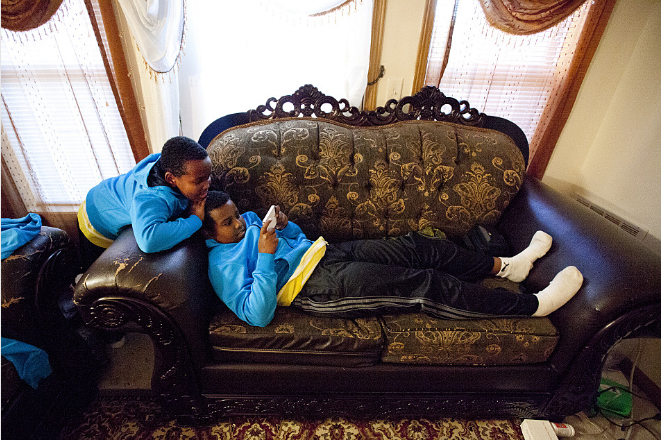 Ishaq Issa watches his brother Ismael play a video game in their Minneapolis, Minn., home on December 6, 2014. Nikki Tundel / MPR NewsBarre and his wife wouldn't have it any other way. "They owe a sense of belonging to somewhere and it has to be here in Minnesota," he said. "I have to give them full freedom for them to exercise and understand the culture they belong to.""I want them to understand who I am, what my values are, the cultures that I had," he said. "But I also want to give them the opportunity to understand their culture so they can choose how to blend the two."When they're older, he hopes they'll look at his photos and see the faces of the Somali refugees who helped make their lives in Minnesota possible."I always tell them, 'Don't be like me, a newcomer,'" he said. "You were born here. You live here."Source: http://www.mprnews.org
Ishaq Issa watches his brother Ismael play a video game in their Minneapolis, Minn., home on December 6, 2014. Nikki Tundel / MPR NewsBarre and his wife wouldn't have it any other way. "They owe a sense of belonging to somewhere and it has to be here in Minnesota," he said. "I have to give them full freedom for them to exercise and understand the culture they belong to.""I want them to understand who I am, what my values are, the cultures that I had," he said. "But I also want to give them the opportunity to understand their culture so they can choose how to blend the two."When they're older, he hopes they'll look at his photos and see the faces of the Somali refugees who helped make their lives in Minnesota possible."I always tell them, 'Don't be like me, a newcomer,'" he said. "You were born here. You live here."Source: http://www.mprnews.org
-
AARHUS, Denmark — In many parts of Europe, he would now be in jail. But here in Denmark’s second biggest city, the young man, a 21-year-old of Turkish descent who spent 13 months inSyria fighting in the name of Islam, passes his days playing soccer, working out at the gym and waiting anxiously to see if he has secured a place to study engineering at a well-regarded local university.
“I feel at home. I have no problems here,” the former jihadist warrior, who spoke on the condition that he be identified only as Osman, said. Since his return to this tranquil port city from the battlefields of Syria, he has been part of a pioneering program that treats onetime fighters not as criminals or potential terrorists but as wayward youths who deserve a second chance.
The program, closely watched by authorities around Europe, involves counseling, help with readmission to school, meetings with parents and other outreach efforts. It was first developed in 2007 to deal with far-right extremists linked to an Aarhus soccer club.
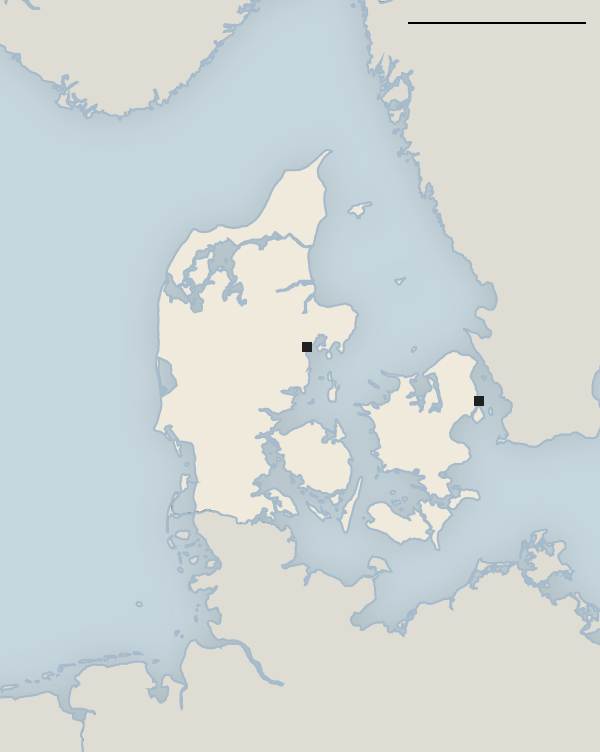
Now, with neo-Nazi hooliganism on the wane and alarm over European jihadists on the rise, it has been redeployed to address one of Europe’s most hotly debated issues: How to deal with hundreds of young Muslims who have gone to fight in Syria and now returned home.
In much of Europe, the answer has been to lock them up, or at least put them under investigation by prosecutors. Belgium, Britain, France, Germany and Norway have all detained many returning fighters, on suspicion that they either joined a terrorist organization abroad or violated restrictions on travel to Syria.
The Netherlands has barred some Syria fighters from returning, and ordered those who do and face trial to wear ankle bracelets. Belgium, the country with the highest number of Syria fighters per capita, has not only targeted returnees but also prosecuted people who stayed at home and encouraged others to go to fight.
Mayor Boris Johnson of London summed up what has become Europe’s most common response in an article in The Daily Telegraph. “We need to make it crystal clear that you will be arrested if you go out to Syria or Iraq without a good reason,” he wrote.
Denmark, with the second-highest number of foreign fighters per capita, has gone in the other direction, shunning punishment in favor of rehabilitation.
“We cannot afford not to include them back in our society and make sure that their path of radicalization is changed, so they can be an active part of our society,” said Jacob Bundsgard, the Social Democrat mayor of Aarhus, a city which is the pioneer of the softer approach.
According to the police, 31 Aaarhus Muslims, all of them under the age of 30, have traveled since late 2012 to Syria to support forces battling the government of Bashar al-Assad, but only one of them went this year. Five of these are believed to have been killed, including two women, and 16 have so far returned home.
“What we are doing seems to be working,” said Jorgen Ilum, the chief of police for the region, describing the program as a “crime prevention” exercise that seeks to “protect society from extremists,” not to mollycoddle jihadists. The police chief acknowledged that full “rehabilitation” of returnees is extremely difficult, and that “none of them are completely normal,” but added that none had veered off into militancy since coming home.
Fears that former fighters may run amok in their home countries have been intense since Mehdi Nemmouche, a 29-year-old French Muslim, killed four people at the Brussels Jewish Museum in May after spending a year in Syria.
A 2013 study by Thomas Hegghammer, a researcher at the Norwegian Defense Research Establishment, involving 945 jihadist fighters who returned from previous conflicts in Afghanistan, Bosnia and elsewhere, found that a maximum of one in nine former fighters came home to plot or carry out attacks in the West. Mr. Hegghammer, in a telephone interview, said the rate for returnees among the approximately 3,000 Europeans who have gone to Syria to fight was, so far, much lower.
In Aarhus, the returnees are screened by the police with help from the domestic security service, known as P.E.T., but so far none of the 16 who came home have been arrested. Instead, they have been offered a “mentor” whose task it is to convince them that militancy has no place in mainstream Islam.
Preben Bertselsen, a psychology professor at Aarhus University whose theories help underpin what is known as the “exit program for radicalized citizens,” said returnees had “lost their moral compass” but “only become ticking bombs if we don’t integrate them” back into society. Aarhus’s approach, he said, aimed to prevent criminal acts by former fighters, not to purge their beliefs. “I am not the political or religious police,” he said.
Erhan Kilic, a Turkish-born Aarhus lawyer and observant Muslim who acts as a mentor, said the biggest hurdle was winning trust. If this can be done, he said, “You can move their ideas in a moderate way” by exposing the flaws in their interpretation of their faith.
Many who left to fight in Syria came from middle-class residential neighborhoods like Rosenhoej, on the outskirts of Aarhus. CreditJan Grarup for The New York Times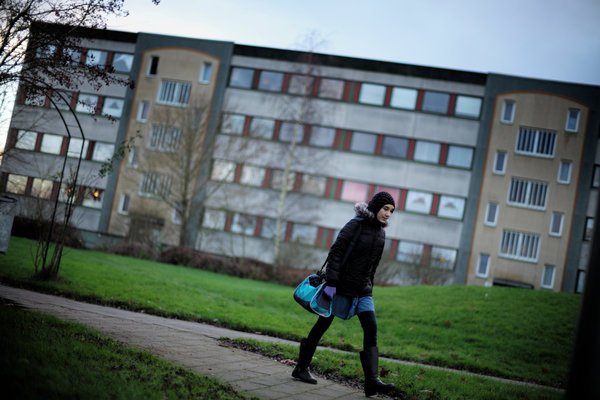
“The problem is not the message of Islam; it is individuals who cause all the problems,” he said, noting that young recruits to militant Islam often know little about their faith and pick up their views from watching videos of incendiary preachers on YouTube or from schoolyard chatter about the West’s humiliation of the Muslim world.
Mohammed, a 25-year-old resident of Somali descent who asked to be identified only by his first name, illustrates how counseling can dissuade at least some young Muslims from extremism. He said he never planned to fight in Syria but did intend to abandon his studies and move to Pakistan after falling in with a group of young radicals who offered friendship and comfort after the death of his mother and a dispute with his high school principal.
Together, he said, they watched videos of Anwar al-Awlaki, the American-born jihadist preacher killed in 2011 in Yemen by a drone attack, and convinced one another that “you can never be a good Muslim in Denmark, where you will always be a stranger, and must move to a Muslim country to get respect.”
After the police, tipped off about the group’s growing radicalism, visited his house, Mohammed agreed to accept counseling and, he said, slowly came to see that “I can be a good Muslim, maybe even a better Muslim, in this society.”
Even when the returnees reject counseling, as 10 of the 16 have, they are often willing to accept assistance in adjusting to society. “I don’t need a mentor. I don’t need their help,” Osman, the returned fighter, said. He nonetheless asked a police officer involved in the so-called “deradicalization project” for help getting into college.
He said he had no regrets about going to Syria and had planned to return to the battlefield after visiting his family. Instead, he got married and hopes to start classes in February. Going to Syria now, he said, “is too dangerous.”
The shift in focus from neo-Nazis to Muslim extremists in Aarhus has led to some controversial revisions to the original program, including an initiative by police to open dialogue with a local mosque that critics say is a breeding ground for radical views.
The mosque, attended by 22 of the 31 who have gone to Syria from Aarhus, promotes a fundamentalist Salafi strain of Islam. Right-wing politicians have demanded that it be shut down, particularly after its preacher, Abu Bilal Ismail, gave a sermon in Berlin this summer that fulminated against “Zionist Jews” and called on God to “count them and kill them to the very last one.”
The mayor, Mr. Bundsgard, said the mosque, Grimhojvej, “is a problem” that is “not doing the local community or the Muslim community any good. Their beliefs are fundamentally unacceptable in any person.”
But closing it without any evidence of illegal action, he said, was not an option. “In an open society,” he asked, “how do you challenge without compromising your fundamental principles the fact that some disagree with these fundamental principles?”
Oussama el-Saadi, the mosque’s chairman, said he agreed to allow the authorities in Aarhus to bring their prevention program into the mosque after winning an assurance that officials did not want to meddle in religious matters and would “show respect” to the mosque’s take on Islam.
He denied that the mosque encouraged young Muslims to go to Syria. He said some of those who went to fight had attended the mosque but “there are hundreds of people who come here, so it is impossible for us to know who they all are.”Toke Agerschou, an official in the local government’s youth department who helps direct the deradicalization program, said dialogue offered the best way “to challenge an entire mind set, a whole worldview.” Putting returnees from Syria in jail, he added, “is easy” but will only expose them to further radicalization, while “integrating them back in society is very hard” but has a higher potential payoff in the long term.
While proud of the results so far, some caution that the real test will come if more hardened fighters who have stayed in Syria and joined the Islamic State militant group start coming home. “If they have returned to Denmark already, they are not real extremists,” Mr. Ilum, the police chief, said.
Source: http://www.nytimes.com
http://www.somaliaonline.com/denmark-with-the-second-highest-number-of-foreign-jihadis-per-capita-shuns-punishment-in-favor-of-rehabilitation/ -
Al Jazeera Media Network is deeply concerned by the Government of Kenya’s threat to bring charges against those involved in the making of Inside Kenya’s Death Squads, broadcast on December 8.Al Jazeera urges the Government of Kenya (GoK) not to attack journalists or to curtail freedom of speech, but instead to confront the serious allegations that its agents commit extra-judicial killings.
Inside Kenya’s Death Squads, produced by the network’s Investigative Unit, features the testimony of a number of members of Kenya’s counter terrorism units. Each states that the police assassinate suspects on government orders. They claim orders come from the National Security Council, a body chaired by President Uhuru Kenyatta.
The documentary was neither “malicious” nor “unethical,” Each point made by the GoK is erroneous and misinformed.
• The promotional material for the documentary never claimed death squads had killed 500 clerics.• The programme gave the GoK ample opportunity to reply to the accusations and included its denials.
• The identities of all persons interviewed and documents released were checked and verified.The investigation was the confirmation of an allegation that has been widespread in Kenya for many years:
• The International Criminal Court has spent more than four years examining evidence of extra-judicial killings said to have been committed by the President and his deputy. The case collapsed after the Prosecutor accused the GoK of “an unprecedented effort to intimidate and interfere with witnesses.”
• In 2009, Wikileaks published a document that provided evidence that over 500 young men were killed or made to disappear in a police campaign.
• The United Nations special rapporteur on extrajudicial executions, Philip Alston, declared in 2010: "I have received overwhelming testimony that there exists in Kenya a systematic, widespread and well-planned strategy to execute individuals.”
• In August 2014, Human Rights Watch issued a report that concluded: “There is strong evidence that Kenya’s Anti-Terrorism Police Unit (ATPU) has carried out a series of extrajudicial killings and enforced disappearances.”• Former Kenyan Prime Minister Raila Odinga said on 9 December 2014 in response to our investigation: “I have been in the National Security Council and I am aware that the government has a hit squad.”The GoK accuses those involved in the production of violating “the democratic space which every Kenyan must protect to prevent our democracy from being appropriated by agents and/ or sympathizers of extremists and terrorist agendas.”
Al Jazeera rejects this claim.
While the team that conducted the investigation is based outside Kenya, the statement appears directed at journalists within the country who examine and report on government abuses.
We note that the GoK is proposing new legislation seeking to punish journalists who are found guilty of “undermining security operations.” According to reports, the Security Laws (Amendment) Bill 2014 seeks to jail such persons for up to three years or fine them five million Kenyan Shilling (55,000 USD) or both.
Al Jazeera defends the right of journalists to freedom of expression and condemns attempts to restrict the work of professional journalism. It stands by colleagues in the profession facing acts of aggression and harassment.
The full documentary is available to watch and embed at. It's been seen by over 225 000 people since premiering on YouTube on 7 December 2014.RegardsKevin Kriedemann & Joy SapiekaPublicists: AfricaAL JAZEERA MEDIA NETWORK+27 83 556 2346 (Kevin)+27 73 212 5492 (Joy)
http://www.somaliaonline.com/press-release-al-jazeera-responds-to-government-of-kenya-statement-on-inside-kenyas-death-squads-documentary/ -
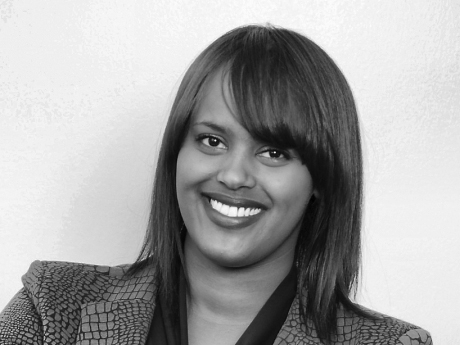 Mayor John Tory said he wanted to improve the relationship between the Toronto Police Service (TPS) and the community, and signaled his intention to sit on the Toronto Police Services Board. As an active participant in discussions about this issue, I find Mr. Tory’s stated focus to be encouraging. But I believe we need a city-wide discussion on defining what we mean by “public safety,” in order to come up with a 21st century mandate for the TPS.The goal of improving relations between the police and community raises an important question: how do police officers actually build trust? It’s a timely problem given the mass outcry in U.S. cities over the lack of indictments against the officers involved in the deaths of Eric Garner and Michael Brown.Since 2012, I’ve been working with Positive Change, an ad-hoc advocacy group fighting to end gun violence in Toronto. With 50 unsolved homicides in Ontario and Alberta since 2005, the Somali-Canadian community in particular has been disproportionally affected by this scourge. In 2012 alone, 18% of homicides in Toronto involved Somali-Canadian men – six were killed between June and October. That summer, I remember spending every other Friday at Khalid Bin Al-Walid mosque, in Etobicoke, praying for the dead and asking myself: What was going on?The only thing worse than the over-representation of young Somali-Canadian men in the homicide and incarceration statistics is the high level of distrust on both sides, police and community. The mutual suspicion has resulted in a lot of cold cases. Positive Change sought to change that dynamic so that residents would be comfortable collaborating with the police in North Etobicoke to improve community-police relations.It was a tough assignment. TPS 23 Division covered an area with a very large Somali-Canadian population, but it had no direct connections into that community. Given the level of gun violence in northwest Toronto, a police division that isn’t representative of the residents they served has resulted in communication gridlock.In 2012, the TPS established the Somali Liaison Unit (SLU) after lobbying from the community. The project was modeled after the success of the Minnesota Police Department’s move to hire Somali-American officers to spearhead a neighbourhood policing program. The problem is, 23 Division’s SLU has no Somali-speaking personnel. Currently, there are three Somali-Canadian police officers serving in the TPS – they’re just not in Etobicoke North.We can talk about community policing, but we need to think about what makes such initiative genuinely effective. In the case of Minnesota, those two Somali-American officers singlehandedly cut the murder rate in half, according to the CBC; there have been no homicides involving that city’s Somali community for over two years.Here in Toronto, the SLU did manage to reduce crime in the Dixon and Queen’s Plate neighbourhoods, but not to the same extent. Moreover, the mere existence of this tiny unit highlights the lack of diversity among 23 Division’s 200 officers, the disproportionate toll that gun violence has had in the Somali-Canadian community, and the absence of trust between residents and local police. If TPS needs a community outreach unit specifically to build trust and improve relations, what are the other officers doing when they go out on patrol?The problem of building trust also extends to the ongoing controversies around police carding, which Tory will inherent once he takes up his role on the Toronto Police Services Board. While he may have grown up in a part of Toronto where “the police officer was your friend,” most racialized youth growing up in low-income neighbourhoods like Dixon had very different experiences.When my youngest brother was in Grade 11, he once had a police cruiser follow him and his friends as they were walking across an open field. The officers drove across a park to interrogate and card these three young black males. They were asked for their identification and offered no apology once the computer check revealed nothing. Incidents like that have happened to him over and over again – five times to be exact – and in fact to most of the black men in my life. It is a common coming of age ritual for some Torontonians and not others, among them the new mayor.The carding policy is based on the assumption that police officers do not know who they’re serving and protecting and therefore need to keep track of who’s who in each patrol zone. As such, it will always pose as an obstacle to trust. Carding in of itself is not the problem. The issue lies in the frequency of street checks, where they tend to occur, and who gets stopped. For so long, the discussion around police-community relations has focused entirely on the merits of the process (carding) that we forgot about the purpose (public safety).In marginalized communities in areas like Etobicoke North, the city and the TPS urgently need to repair this fractured relationship in order to build trust as a means of improving public safety. The two goals should go hand in hand.
Mayor John Tory said he wanted to improve the relationship between the Toronto Police Service (TPS) and the community, and signaled his intention to sit on the Toronto Police Services Board. As an active participant in discussions about this issue, I find Mr. Tory’s stated focus to be encouraging. But I believe we need a city-wide discussion on defining what we mean by “public safety,” in order to come up with a 21st century mandate for the TPS.The goal of improving relations between the police and community raises an important question: how do police officers actually build trust? It’s a timely problem given the mass outcry in U.S. cities over the lack of indictments against the officers involved in the deaths of Eric Garner and Michael Brown.Since 2012, I’ve been working with Positive Change, an ad-hoc advocacy group fighting to end gun violence in Toronto. With 50 unsolved homicides in Ontario and Alberta since 2005, the Somali-Canadian community in particular has been disproportionally affected by this scourge. In 2012 alone, 18% of homicides in Toronto involved Somali-Canadian men – six were killed between June and October. That summer, I remember spending every other Friday at Khalid Bin Al-Walid mosque, in Etobicoke, praying for the dead and asking myself: What was going on?The only thing worse than the over-representation of young Somali-Canadian men in the homicide and incarceration statistics is the high level of distrust on both sides, police and community. The mutual suspicion has resulted in a lot of cold cases. Positive Change sought to change that dynamic so that residents would be comfortable collaborating with the police in North Etobicoke to improve community-police relations.It was a tough assignment. TPS 23 Division covered an area with a very large Somali-Canadian population, but it had no direct connections into that community. Given the level of gun violence in northwest Toronto, a police division that isn’t representative of the residents they served has resulted in communication gridlock.In 2012, the TPS established the Somali Liaison Unit (SLU) after lobbying from the community. The project was modeled after the success of the Minnesota Police Department’s move to hire Somali-American officers to spearhead a neighbourhood policing program. The problem is, 23 Division’s SLU has no Somali-speaking personnel. Currently, there are three Somali-Canadian police officers serving in the TPS – they’re just not in Etobicoke North.We can talk about community policing, but we need to think about what makes such initiative genuinely effective. In the case of Minnesota, those two Somali-American officers singlehandedly cut the murder rate in half, according to the CBC; there have been no homicides involving that city’s Somali community for over two years.Here in Toronto, the SLU did manage to reduce crime in the Dixon and Queen’s Plate neighbourhoods, but not to the same extent. Moreover, the mere existence of this tiny unit highlights the lack of diversity among 23 Division’s 200 officers, the disproportionate toll that gun violence has had in the Somali-Canadian community, and the absence of trust between residents and local police. If TPS needs a community outreach unit specifically to build trust and improve relations, what are the other officers doing when they go out on patrol?The problem of building trust also extends to the ongoing controversies around police carding, which Tory will inherent once he takes up his role on the Toronto Police Services Board. While he may have grown up in a part of Toronto where “the police officer was your friend,” most racialized youth growing up in low-income neighbourhoods like Dixon had very different experiences.When my youngest brother was in Grade 11, he once had a police cruiser follow him and his friends as they were walking across an open field. The officers drove across a park to interrogate and card these three young black males. They were asked for their identification and offered no apology once the computer check revealed nothing. Incidents like that have happened to him over and over again – five times to be exact – and in fact to most of the black men in my life. It is a common coming of age ritual for some Torontonians and not others, among them the new mayor.The carding policy is based on the assumption that police officers do not know who they’re serving and protecting and therefore need to keep track of who’s who in each patrol zone. As such, it will always pose as an obstacle to trust. Carding in of itself is not the problem. The issue lies in the frequency of street checks, where they tend to occur, and who gets stopped. For so long, the discussion around police-community relations has focused entirely on the merits of the process (carding) that we forgot about the purpose (public safety).In marginalized communities in areas like Etobicoke North, the city and the TPS urgently need to repair this fractured relationship in order to build trust as a means of improving public safety. The two goals should go hand in hand. Idil Burale is a Somali-Canadian community advocate and former political staffer at Queen’s Park.She recently ran for a city council seat in Toronto's Ward 1.
Idil Burale is a Somali-Canadian community advocate and former political staffer at Queen’s Park.She recently ran for a city council seat in Toronto's Ward 1. -
Amina sits idle in the shade of her makeshift restaurant. A pot of boiling kidney beans near her toes and a cardboard case of fifteen brown eggs remind her of the work to be done, the work she can’t do yet. She counts the eggs again, tapping her henna-orange fingernail on the shit-and-feather encrusted shells, one by one. She arrived in the upper-class Hara Mus neighborhood of Djibouti City in the gray dawn haze before the construction workers appeared, before the first call to prayer, before the sun slinked through low clouds over the Gulf of Tadjourah.She claimed a wooden plank stool. Emptied yellow oil jugs, turned on their sides and indented from hours of serving as chairs, are harder to balance on and Amina will work here until early afternoon. The stool sits lower to the ground than the jugs and provides easier access to her knives, pots, vegetables, and fire, and her back needs the sturdy support.Little known outside the Horn of Africa, Djibouti is strategically positioned at the crux of shipping lanes linking the Mediterranean and the Indian Ocean via the Red Sea and is in the throes of rapid development. Amina has taken advantage of the masses of construction workers and used diligent entrepreneurialism to carve out a niche for herself. Thirty-five years of independence from France and a consistent peace, other than minor skirmishes with Somaliland to the east and Eritrea to the north and a brief civil war in Afar territory in the early 1990s, has allowed Djibouti a steady momentum, though opportunities for employment remain limited. The CIA World Factbook quotes, as of September 2014 but based on a static estimate from 2007, a 59% urban unemployment rate and an 83% rural unemployment rate. Amina, with her tea and eggs and beans, is one of these officially unemployed people and the nature of her work ensures that she will be, year after year. Scraping for franc and earning barely enough to cover daily expenses leave little room for paying down her debts and no room for advancement.The 2014 Misery Index lists Djibouti as one of five countries with ‘extremely high estimated Misery Indices’ but is unable to give it an updated ranking due to Djibouti’s lack of updated statistics. For Amina, the only numbers that matter are how many men will she feed today? How many will pay? How much will her supplies cost? How many people in her family will she be able to feed tonight?I drove by these rickety stalls and anonymous people every day. I wondered about the women, bent at the waist over smoking charcoal fires. About the men, hurriedly eating breakfast and jumping up to catch a ride to work on a passing flatbed truck. My husband is a professor at the University of Djibouti. When we transplanted our lives from Minnesota to the Horn of Africa my aim was never to float above the culture that welcomed us. I wanted to understand it, experience it, discover the realities of average Djiboutians.One day, for no reason deeper than curiosity, I stopped beside a random stall. I introduced myself in Somali. I told the woman the truth. I wanted to learn about the life of a woman who ran a makeshift restaurant. She laughed. No local person thought her life was interesting or unusual, no foreigner ever stopped. She wondered if I was crazy and ordered me to pull up a plastic jug to sit on. She ordered me to take notes. Her name was Amina and she invited me to spend the week with her.Amina keeps the soles of her feet flat to the ground, heels touching. Her knees splay out to either side and her shiid, a cotton dress sewn from a single rectangular piece of cloth with holes cut out for the head and arms, is pulled taut between her legs to form a resting place for her elbows. A peach shalmad, or headscarf, is tight around her face and brings out the hint of amber in her eyes. She scans the area. The clusters of men as they clamber down from open-sided lorries and saunter to work sites, cement trucks that lumber into the yards and kick up halos of dust, and the brightening sky, to see how long she has until the men swarm her for breakfast.Hara Mus hosts the new United States embassy (2012), president Ismail Omar Guelleh’s house, and the prime minister’s home. The road past Amina’s restaurant is paved, smooth and clean, and the women who own restaurants here are meticulous in picking up their plastic bags, tin cans, and piles of ash left after lunch. They feed scraps to pigeons and give potato peelings to elderly men who haul the leftovers to herds of goats on the other side of the mosque that stands where the pavement ends. The president might drive by here today, for noon prayers. Or maybe on Friday for the holy day’s sermon and no one wants to bear the shame of displaying a disorderly work place.Normally, Amina’s hands don’t stop moving. Normally, she doesn’t look at the men walking to work or the purple onions she slices. Normally, onion skins drop at her feet, white fleshy onions steadily fall into a pot until it overflows. Normally, eight kilos of onions, chopped before dawn and not a single tear from onion-burn dampens her cheeks. She is more cautious with the chili peppers and sometimes hands garlic cloves to Guleed to peel. Guleed is five years old and smiles proudly to reveal the gap where his two front teeth are missing. He roams between the restaurants, helps peel potatoes and delivers messages and earns vanilla crème-filled cakes or coffee flavored lozenges for his efforts.
But today Amina’s hands are still and she folds them over her stomach. Then she stirs the beans, folds her hands again. She sighs and looks to her right, at another restaurant where two women bend over heaps of tomatoes and smoke curls up between them like jinn.There are four restaurants like hers on this block, serving the same meals at slightly varied intervals, to alternating construction crews. The men appear like shifting shadows in unfinished windows and between whitewashed pillars. They cement and paint rooms larger than their homes. They chant while they work, their words and the foreman’s whistle provide a rhythm for passing buckets of wet cement. There is a constant, unhurried but persistent pace.Amina’s husband works at the house directly in front of her but they don’t acknowledge each other during work hours, both concentrated fully on the job and need of the moment. Cement buckets thrust up, beans stirred. Cement buckets coming down, ground tea leaves spooned into boiling water, a carefully choreographed ballet.“Allah doesn’t give us anything,” Amina says. She protects her hand from the heat of an aluminum pot cover with a page of newspaper and covers the tea, whips the beans with a quick flick of her wrist, and bangs the metal spoon against the pot.Today the truck that should have delivered her onions, tomatoes, potatoes, hot peppers, and garlic never came. Amina calls her coworker Deeqa and shouts orders: stop at the market, purchase supplies on credit, take a taxi. Hurry.Amina started the restaurant itself on credit. She used to borrow from neighborhood dukaanssimply for food and prayed she could pay back what she owed at the end of the month. But in 2007 she’d had enough of borrowing and praying. She wanted to work. She borrowed 80,000 franc worth of supplies, over $400, and opened a restaurant. Six years later she still owed almost the entire 80,000. She brought in small amounts of cash in months when she had a surplus but it barley dented the total. Sometimes the shopkeeper harassed her, sometimes he ignored her, but mercifully, he never charged interest. Maybe in the future, maybe in a hundred years, Amina would be debt free.Water in a handle-less pot over a third fire of wood-based charcoal begins to boil. Amina rips open six packets of spaghetti noodles with her teeth and fills the pot. She adds two handfuls of coarse salt, replaces the dented cover, and drops her hands back into her lap.A rice sack stuffed with thirty limp baguettes leans against Amina’s shack. Her produce should have arrived with this bread but the white van broke down. The bread man pushed his cart from the bakery and brought the bread, not enough, and the news that the van wasn’t coming.Now Amina’s bean-breakfast for the construction workers is bland and her baguettes are cold. Her lips narrow under the strain. If she doesn’t get any produce for lunch, and get it soon, she will lose the entire day and possibly some clients. She might not eat. She might have to walk the roughly ten kilometers home. She leans against the restaurant but doesn’t rest her full weight against it.Sheets of rippled aluminum balanced on top of splintering plywood slats form the three-walled structure. The boards are nailed together with long rusty nails, which poke clear through and when Deeqa arrives she ducks to avoid getting sliced across the forehead. A torn blue mosquito net waves in the humid breeze at the entrance to the restaurant and blends into the sky as the sun peeks over the rounded top of a newly constructed, uninhabited and ocean-side mansion.The Gulf of Tadjourah is less than a kilometer from Amina but she sits with her back to the ocean. The water isn’t visible from here anyway. It used to be, until the building boom of 2010 began, then the United States embassy and rows of diplomatic housing and a new mosque sprang up. Now intimidating black and gold gates block the old dirt paths to the ocean and Amina’s restaurant is surrounded by construction sites and homes modeled after the American White House.She doesn’t mind not being able to see the ocean, she didn’t establish a presence here for the view. She moved in because of the construction. Where there are new buildings, there are workers and where there are workers, there are hungry stomachs and parched throats. As Djibouti expands, even into the ocean on manmade sandbars and landfills, these construction sites are further and further from her home in Hayablay but Amina shrugs her supplies higher on her shoulder and trudges the extra blocks, extra kilometers, between work and home.She sighs again and pushes her palms against her knees, stands, hikes her shiid up under her armpit to keep it from dragging, and walks to the closest restaurant stall. Amina explains to Fadouma and Nasra, the mother-and-daughter team, that she needs produce. She returns with five tomatoes, two onions, and a green chili pepper. Within minutes all of it is peeled, chopped, and in the pot with the beans.In 2010 Amina hired Deeqa. Deeqa sold tea and sharab, cold water mixed with Vimto, a thick, blood-red fruit juice flavoring. Together, she and Amina have become a formidable supplier of breakfast, lunch, tea, and cool drinks.“We share work and sweat,” Deeqa says. “We are sisters.” She thinks she is twenty-five years old. Or, she might be thirty-seven. The truth most likely lies somewhere in between but exact ages are not as relevant as the fact of survival for those on the fringes.
Amina is quiet and steady, seamless in her labor, her mind on the work, the timing, and the money. Or lack of money. Or lack of produce. She is taller and stockier, more careful with her scarf and maintains a calm focus on the flow of food. She has no patience for flirtations or joking. Deeqa’s lower lip protrudes and she pulls it in when she laughs, often and loud, scratchy like a smoker. Her lower belly also protrudes and she tucks her shiid up in the front rather than on the sides under her armpits like Amina, which gives her the appearance of a front-heavy pear or a pregnant woman.“I don’t have time for more babies,” Deeqa says, though. “I’ve got my daughter and my husband divorced me. No more men, no more babies. That’s fine with me.”Deeqa isn’t clear about why she and her husband got a divorce. She suspects their troubles stemmed from her had a cesarean section. Divorces over c-sections aren’t unheard of. Deeqa is content to raise and provide for her daughter, content to not worry about also providing for a husband or another baby.This doesn’t stop her from scooping extra beans or giving tea to men she knows won’t pay. She doesn’t even bother to write down their names. She smiles, they ask her to marry them, she insults them, “Aabo wus,” father-fucker.Deeqa’s job includes bringing the day’s supply of meat just before breakfast. She walks from the bus stop, hauling a white rice sack of supplies with another woman, each of them holding one corner of the bag and swaying back and forth in a coordinated gait. The first thing she does when she reaches Amina is remove her red shalmad. She wears a bright purple or green masar, smaller and tighter over her hair, and drapes the bulkier scarf over a meter-high wooden pole jutting at an angle from the ground on their corner. The scarf hangs like a siren, a bright marker against the background of desert and towering white security walls. Deeqa is here.Today, Deeqa rides in a taxi like Amina instructed her and Amina calls out, “Where did you find that taxi? That’s a boy. A baby can’t drive a taxi.”She is visibly relieved and cracks a fleeting smile. The driver lugs old USAID satchels of potatoes, onions, tomatoes, hot peppers, and garlic to the restaurant. Amina grabs an onion. A yellow plastic bag is tied around her thumb to protect from blisters and the knife blade and she drops onion chunks into a ten-liter capacity bowl at her feet, finishing one before Deeqa has the chance to toss her shalmad.Most of the supplies are bought on credit or through an exchange of goods and services, little hard currency changes hands except at the end of the month when the construction workers receive their salaries, pay what they owe to Amina. No one charges interest and no one claims collateral, communal pressure provides the necessary accountability.Amina relies on water from one of the new, occupied houses. She fills her jugs from a yellow hose the gardener tugs outside the front gate. Later, she delivers kilos of ground sorghum flour in exchange. A woman with a raisin-wrinkled face and calloused feet walks through the neighborhood a few times per week and exchanges whole cumin or black pepper kernels, which she carries in cut-off plastic water bottles, for meals and tea. She receives half a baguette or a cup of Vimto.
Deeqa bends from the waist, her legs and back straight, and filters tea through a strainer into two thermoses. She cracks open two cans of sweetened condensed milk with the blade edge of a knife, folds back the top, and adds it to the tea. She pours the thermoses back and forth to mix and drinks the dregs from the condensed milk cans. Amina’s hands pick up the pace and she tosses more tomatoes into the beans.Here come the men. Amina has enough time to add a few more hot pepper slices before they cross the street and no one will know how close she came to being shut down. They swoop in like a flock of crows, demanding, dogged, and covering the ground with little respect for personal space.The men don’t behave indifferently and brusque out of callousness or patriarchy or laziness. They are as bound to their labor as Amina is to hers. They work from six in the morning. until late in the afternoon with only ten minutes for breakfast, fifteen for lunch. Between hoisting buckets filled with cement and hammering and climbing up and down faux-marble stairs, their muscles burn and sweat darkens their shirts from the neck to the waist.There is no time to debate issues of gender-influenced labor roles. There are no accusations of selfishness, of taking advantage, no one demands a please or a thank you. The men need the women and the women need the men and their system, hardened and brutal and efficient, works. There is little time for friendship, only time for nourishment, though in the laughter and the extra splashes of sauce, kindness emerges.But there is always time for flirting, which is how I received two marriage proposals in two days. And a third, sideways proposal in the form of a rebuke for not introducing one of the workers to my father, who could arrange a marriage between us had he not lived in Minnesota, had I not already been married.“Your husband has a good job?” Mohammed asks.I nod.“You could throw him away and I could throw my wife away and we could be happy.”I quote a Somali proverb about a man who saw a camel in the sky and threw away the donkey in the yard. Ninka awrka cirka arkay dameerka heerka ayuu ka tuuray. The men laugh and bits of bread and beans fly from their mouths to the ground.“Write in your notebook that there are three men here without wives.” I shade my eyes from the sun and squint up at a tall, narrow-hipped man in hiking books and a blue hardhat. “There are nine men here without wives. None of the men here have wives.” He flourishes his breakfast baguette at the other construction workers.Half a dozen men ask me to find them wives and an older man rolls his eyes. “They all have wives already, a man without a wife isn’t any good.”Suddenly breakfast is over and the men head back to their work sites. Most of the plates look nearly clean, only a few streaks of beans or puddles of oil left behind. There is no time to talk about the morning or for Amina and Deeqa to complain that now they must work faster because of the late vegetable delivery to prepare for lunch. There is only time for Amina to whisper, “Alhumdillalah,” while she uses the crusty butt ends of baguettes to swipe remaining beans. She shoves the food into her right cheek and chews, slices more onions, checks the position of the sun over her shoulder, calculates the timing until lunch. Praise Allah.•Amina survived that day but shortly afterwards she and Deeqa had to move. The house being worked on by the construction workers they served was nearly finished. Fewer men came and at inconsistent hours, just to add finishing touches. Things Amina only dreamed of like electricity wiring and water pumps and curlicues carved into plaster and staircase banisters and glass windows. The house remains empty a year and a half later, large and echoey and casting a massive afternoon shadow over Amina’s abandoned workspace. White chalk marks off the dimensions of a mansion to eventually be built on her corner. She gathered her supplies and moved to the next promising location, near the police station on Rue d’Arta. This one is not near new construction sites but near the main bus route.She and Deeqa split up. Still friends but Deeqa wanted to try managing her own restaurant. There is not much open space on Rue d’Arta for new restaurants, each one wedged between others. Less room for flamboyancy and the women needed breathing room, which really meant they needed a space to call their own, even if it was simply a patch of dirt beneath warped wooden planks and cloth shades flapping in the wind.Like the men she cooked for, like the woman carrying spices in plastic water bottles, Amina lives an itinerant life, ever on the lookout for where her skills might fit a niche, for where she can earn a few coins for bread and tea. Officially, it is unclear whether the employment statistics Amina is not included in have budged or not, but people working in these types of day labor jobs say not much has changed even while Djibouti explosively expands. That explosive expansion includes more restaurant and tea shops sprouting like mushrooms on street corners and in the shade of new construction sites. There are always women willing to cook and men hungry to eat. These women often lack the reading and writing skills or education or legal paperwork that could launch them into actual, statistically relevant careers. Amina is one among a horde, singular in her story but universal in her labor.And she does have skills. She can cook, she can do basic math, she can show up and work hard, sweat streaming down her back. As long as Amina is able to work, customers will come for her pasta and rice, her fried onions and Vimto-flavored water. As long as Amina is able to work, she will remain unemployed and, insha Allah five franc at a time, she will pay down her debts. If God wills. • 8 December 2014
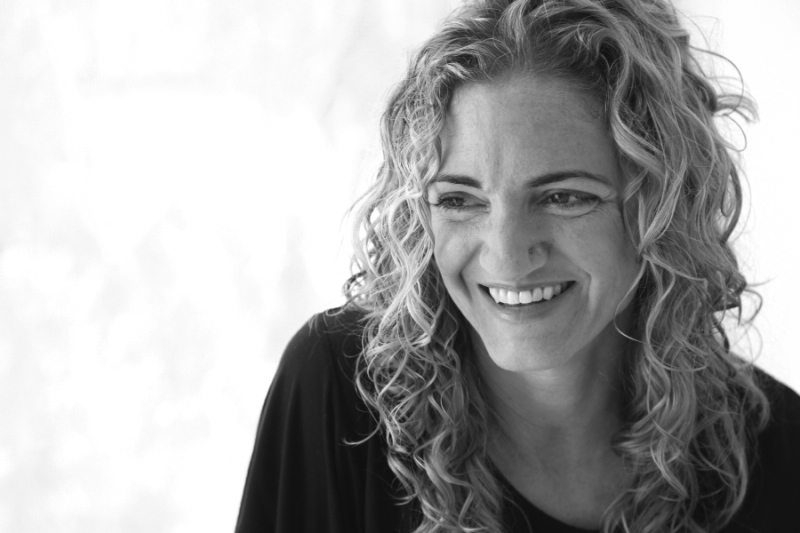 Rachel Pieh Jones is a writer raised in the Christian west who now lives in the Muslim east. Her work has been published in the Christian Science Monitor, the New York Times, and the Huffington Post among others. Find out more at her website here.
Rachel Pieh Jones is a writer raised in the Christian west who now lives in the Muslim east. Her work has been published in the Christian Science Monitor, the New York Times, and the Huffington Post among others. Find out more at her website here.
-
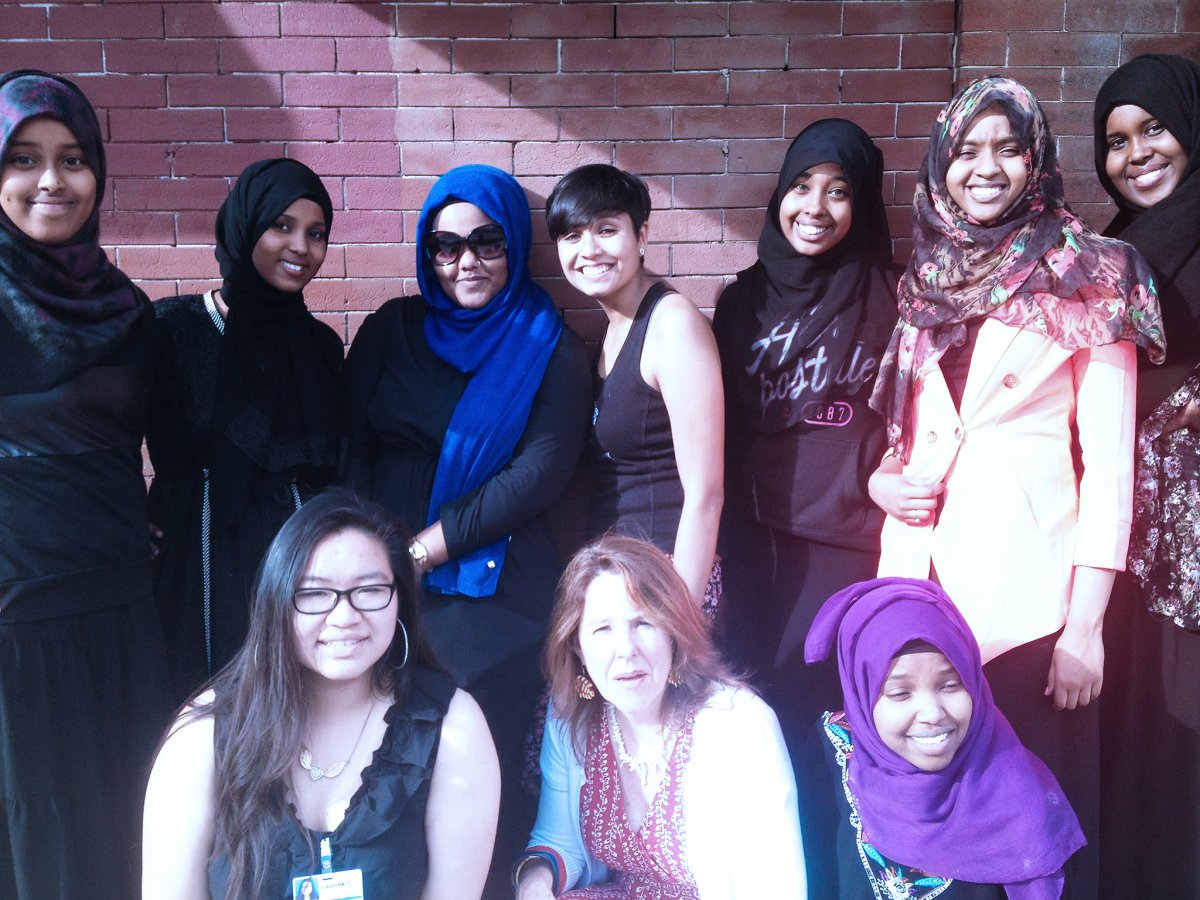 At first glance, the new Sisterhood Boutique on Riverside Avenue next door to Augsburg College and the University of Minnesota's West Bank campus looks like many other spunky startups around town.It’s packed with racks of blouses, jackets, dresses, slacks and shorts, displays of boots, shoes and jewelry, shelves of purses and bags, a vase of sunflowers and scarves hanging on the walls. The selection ranges in style from contemporary to retro to East African. This is clearly the work of women who have applied their talents to transform an empty storefront into a destination for shoppers looking for fashions at affordable prices.All true. But there’s more to the Sisterhood story, which defies all the usual expectations. It was started by group of young Somali women who noticed how much fun their brothers and male classmates had running a coffee shop at the Brian Coyle Community Center in the Cedar Riverside neighborhood.“We felt like there were not a lot of activities for girls in the community,” remembers Khadra Fiqi, an assistant at the store who was a Minneapolis South High School student at the time. “So we had a meeting of girls to talk about what we wanted to do. There’s a strength in girls and we wanted to do something for our community to create more opportunity.”They agreed to start a women’s clothing store, and quickly came up with the name Sisterhood of the Traveling Scarf, based partly on the movie and novel "Sisterhood of the Traveling Pants." And based partly on the fact that, as Fiqi says, “scarves are something that unite all women, and we are a sisterhood of women.”“We went around to other stores to see what businesses are like,” recalls Fiqi, now a first-year student at Metro State University, “and we learned a lot about commitment — if you’re committed to something you can make it happen. Women with passion and power can help ourselves and help our community.”
At first glance, the new Sisterhood Boutique on Riverside Avenue next door to Augsburg College and the University of Minnesota's West Bank campus looks like many other spunky startups around town.It’s packed with racks of blouses, jackets, dresses, slacks and shorts, displays of boots, shoes and jewelry, shelves of purses and bags, a vase of sunflowers and scarves hanging on the walls. The selection ranges in style from contemporary to retro to East African. This is clearly the work of women who have applied their talents to transform an empty storefront into a destination for shoppers looking for fashions at affordable prices.All true. But there’s more to the Sisterhood story, which defies all the usual expectations. It was started by group of young Somali women who noticed how much fun their brothers and male classmates had running a coffee shop at the Brian Coyle Community Center in the Cedar Riverside neighborhood.“We felt like there were not a lot of activities for girls in the community,” remembers Khadra Fiqi, an assistant at the store who was a Minneapolis South High School student at the time. “So we had a meeting of girls to talk about what we wanted to do. There’s a strength in girls and we wanted to do something for our community to create more opportunity.”They agreed to start a women’s clothing store, and quickly came up with the name Sisterhood of the Traveling Scarf, based partly on the movie and novel "Sisterhood of the Traveling Pants." And based partly on the fact that, as Fiqi says, “scarves are something that unite all women, and we are a sisterhood of women.”“We went around to other stores to see what businesses are like,” recalls Fiqi, now a first-year student at Metro State University, “and we learned a lot about commitment — if you’re committed to something you can make it happen. Women with passion and power can help ourselves and help our community.”From sorting to selling
Fiqi explains that she and her colleagues do everything it takes to run the business, “from sorting the clothes, tagging them, cleaning the store, being at the front as a cashier. I always thought of myself as a science person, not a business person. But now I am going to minor in business in college.”The experience of opening the store helped Fiqi feel more at home in Minneapolis. “I was really surprised about all the support from people we don’t really know — people at Augsburg College and around the community.”Stella Richardson, a management major at Augsburg, was one of those who pitched into help launch the boutique. While still in high school, she had started the Express Yourself Clothing store on Selby Avenue in St. Paul as part of an after-school youth program. “I told the girls about my experience and came to their meetings. As they were opening the store, I taught some business classes to them at the Brian Coyle Center.”“They asked all the same questions I was asking when I started my store,” Richardson says. She notes that their boutique was even funded by one of the same organizations that financed her business, Sundance Family Foundation. Other funders of the Sisterhood Boutique were Augsburg College, Fairview Health Services, Women’s Foundation of Minnesota, the Marbrook Foundation and the Women Investing in the Next Generation (WINGs) Fund of the Greater Twin Cities United Way.Augsburg students helped them devise a business plan, implement a marketing plan and design a logo, and offered informal advice on how to attract young customers studying and working on the nearby campuses of Augsburg, the U of M, St. Catherine University and the University of Minnesota Children’s Hospital.“The store is changing the way the community perceives girls — in Somali culture girls are the most protected part of the community,” says Amano Dube, director of the Brian Coyle Community Center. “This project shows what they can do on their own.”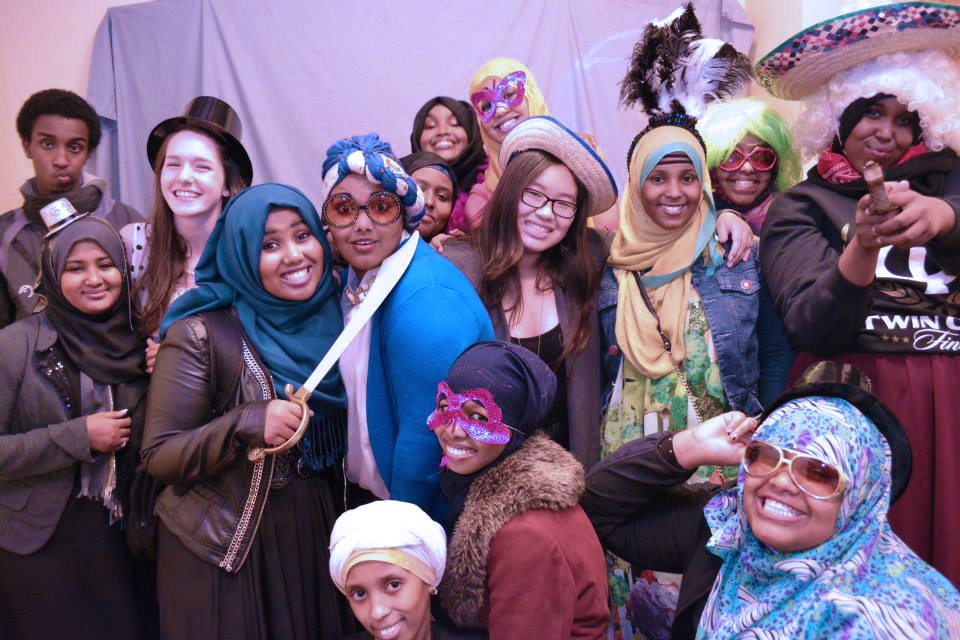
A breakthrough
Dube said that when a group of local leaders involved with the Faith in the City initiative toured the neighborhood — including Rulon Stacey, CEO of Fairview Health Services, which owns a brick storefront on Riverside Avenue that is adjacent to its University of Minnesota Children’s Hospital — “Augsburg President Paul Pribbenow brought them to the Brian Coyle Center and I took them into the leadership training class with the young people, who told them about the store.”“Mary Laurel True [Augsburg’s director of community engagement] was leading the tour, and she suddenly announces that the girls would really like to have that building on Riverside Avenue,” remembers Pribbenow. Twenty-four hours later the president of Fairview called Pribbenow and said the boutique could have the building for free.“We had the space available,” Stacey says, “and want to be a meaningful partner in the neighborhood. We’re really excited about it.”Stacey was on hand at the boutique’s Grand Opening last summer, posing for a photo with the young proprietors in front of shop windows artfully displaying sundresses. Indeed, it was an all-out community event. Amano Dube, Mary Laurel True, Stella Richardson and a number of young shoppers were part of the celebration.“I’m really excited about it,” said shopper Elena Eveslage. “It’s a good place to get good, cheap clothes, and a great opportunity for young women to learn business skills.”20 trained so far
Fadumo Mohamed, a student at Minneapolis Southwest High School, was part of planning meetings and jumped at the chance to work at the store. “This is my first real job. It’s really good here, getting closer to people in the community, working with people my own age, learning about business. It will all be on my résumé.”Store manager Laurine Chang, who is also a youth social entrepreneur coordinator forPillsbury United Communities, notes that 20 young women have been trained so far to work in the store. For three months they “learn about leadership, empowerment, personal and professional development, how to engage in the community, financial literacy, customer service, time management and business management.”“The girls themselves felt there was a need for more opportunities for women in the neighborhood,” Chang says. “This project really is young people taking the initiative by responding to what the community needs."Source: Source: http://www.minnpost.com -
Speaking exclusively to Al Jazeera’s Investigative Unit, officers from four units of Kenya’s counter-terrorism strategy admitted the police assassinate suspects on government orders.
An Anti-Terrorism Police Unit (ATPU) officer said the order comes from Kenya’s National Security Council: “It comprises of the President, Deputy President, Chief of the Defence Forces, Inspector General of Police, National Security Intelligence Service Director, Cabinet Secretary of Interior, and the Principal Secretary Interior. Any decision is made within that club of people.”
President Uhuru Kenyatta and National Security Council members denied running an extrajudicial killing programme.
Police eliminations, according to the ATPU officer, could run into the hundreds every year: “Day in, day out, you hear of eliminating suspects. We have the police itself. We have special units like GSU. So not a total, but you can say about almost 500.”
The officers admitted to personally killing suspects. The General Service Unit (GSU) Recce Company officer said: “Since I was employed, I’ve killed over 50. Definitely, I do become proud because I’ve eliminated some problems.”
The officers said Kenya’s weak judicial system forces them to resort to assassinations, as the police have failed to produce strong enough evidence to prosecute terror suspects, with only one conviction recorded.
“If the law cannot work, there’s another option… Eliminate him,” said the GSU Recce Company officer.
Abubaker Shariff Ahmed was a controversial Muslim radical known as Makaburi. Despite being charged under Kenya’s terrorism laws, he was never convicted.
In April he was gunned down outside a Mombasa court. Human rights groups claim he was one of 21 Muslim radicals allegedly killed by police since 2012.
Speaking to Al Jazeera, the officers confirmed this for the first time.
“Makaburi was killed by the police,” said one officer. “That execution was planned in Nairobi by very top, high-ranking police officers and government officials.”
Al Jazeera exclusively obtained confidential police reports, which purport to show Makaburi had extensive links to Somali militant group al Shabaab and had planned and financed bombings in Kenya.
The officers claim the intelligence, which drives the government’s “elimination programme,” was supplied by Western security agencies.
The GSU Recce Company officer said: “Once they give us the information, they know what they have told us. It is ABCD: ‘Mr. Jack’ is involved in ‘such and such’ a kind of activity. Tomorrow he’s no longer there. We have worked. Definitely the report that you gave us has been ‘worked on’.”
A Kenyan National Police spokesperson refused to comment on the allegations.
According to the officers, Britain provides training, equipment and intelligence to the units,
Israel conducts more specific training, according to a GSU Radiation Unit officer: “We get some instructors from Israel,” he said. “How to eliminate. Actually it’s one of the training.”
Mark Ellis, the head of the International Bar Association, warned the alleged complicity of these countries could violate international law.
Ellis said: “It’s clear based on these interviews that there's at least prima facie evidence to suggest that these third party countries are involved and therefore they all have responsibility to investigate.
“We should stop providing any type of assistance or training to police units in Kenya until there is a clear change… in how the Kenyan authorities deal with suspects.”
Britain and Israel denied involvement and the UK Foreign Office said it had “raised concerns” with Kenya over the “serious allegations.”
Inside Kenya’s Death Squads premieres on Monday, 8 December 2014 at 2000 GMT / 2200 CAT.
Source: http://www.aljazeera.com/news/africa
-
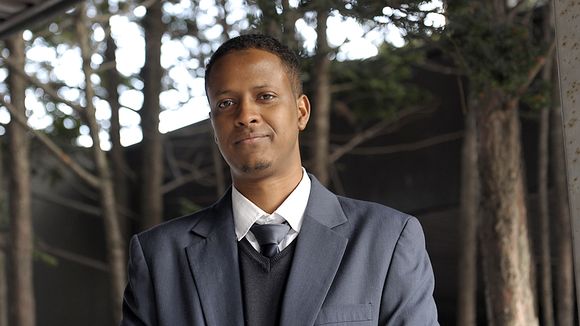 The 2014 recipient of the Immigrant Man of the Year award – also known as the Mr. Immigrant award by the Finnish Refugee Council – was selected on the basis of his positive impact on society. The 29 year-old Somali native Aadan Ibrahim was singled out by the organisation for his work helping immigrant youth. The Vantaa resident works with the R3 association, a support group for young migrants.“By presenting this award to Ibrahim we want to remind others that even migrants with the most difficult backgrounds are working hard to participate in building our society,” said FRC head Annu Lehtinen.Ibrahim arrived in Finland from Somalia in 1996 to escape political unrest. He was alone in Finland except for his then twenty year-old sister who had settled in Finland a few years earlier. After graduating as a youth counselor he went into the army and later began working with young immigrants in Vantaa.He described the work of R3 as essential, noting that workers in official channels don’t always have the time to help young adults wrestling with an assortment of different problems. The organisation also hosts "inspirational evenings" for its members, where young people can hear success stories told by other immigrants.“I’m always energised when we can help someone who faces discrimination to get a job or a place to live,” Ibrahim explained.
The 2014 recipient of the Immigrant Man of the Year award – also known as the Mr. Immigrant award by the Finnish Refugee Council – was selected on the basis of his positive impact on society. The 29 year-old Somali native Aadan Ibrahim was singled out by the organisation for his work helping immigrant youth. The Vantaa resident works with the R3 association, a support group for young migrants.“By presenting this award to Ibrahim we want to remind others that even migrants with the most difficult backgrounds are working hard to participate in building our society,” said FRC head Annu Lehtinen.Ibrahim arrived in Finland from Somalia in 1996 to escape political unrest. He was alone in Finland except for his then twenty year-old sister who had settled in Finland a few years earlier. After graduating as a youth counselor he went into the army and later began working with young immigrants in Vantaa.He described the work of R3 as essential, noting that workers in official channels don’t always have the time to help young adults wrestling with an assortment of different problems. The organisation also hosts "inspirational evenings" for its members, where young people can hear success stories told by other immigrants.“I’m always energised when we can help someone who faces discrimination to get a job or a place to live,” Ibrahim explained.Poor economy undermining integration efforts
Ibrahim said that he’s most troubled by the twin problems of unemployment and homelessness facing migrant youth.“The economic situation has also affected integration and we can see it in the lack of housing. We need to find new solutions and tactics. For example in Vantaa we have had positive experiences with shared accommodation,” he remarked.He also condemned the limited availability of Finnish-language courses for young migrants.“It can’t be that you have to wait a year to get into a language course. At the same time (that they’re waiting) young people receive benefits and this makes them passive,” he warned.Ibrahim advised newcomers to Finland to get out and about in their local communities as an important means of integrating into Finnish society.“Get to know your neighbours,” he counseled both natives and non-Finns.As the new face representing migrants in Finland, Ibrahim will spend the next year speaking about the status of his peers. He’s also looking forward to exciting developments in his personal life, as he awaits a decision by Finnish immigration authorities on his application to have his wife and infant child join him in Finland.“It may come in the New Year,” he said optimistically.Source: http://img.yle.fi/uutiset -
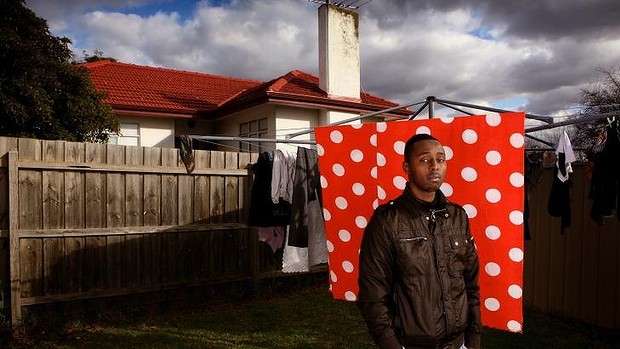 On 14 July 2008, a young Somali man stood trial in the County Court of Victoria for the rape of a forty-eight year old woman while she was unconscious at a Doncaster night-club. The man, twenty-one year old Farah Abdulkadir Jama of Preston, pleaded not guilty to the crime. The jurors saw in the dock an athletic-looking African youth with strong features. Eyebrows raised, head tilted slightly back, he appeared dismissive and defiant.He appeared defiant even as the Crown led DNA evidence of Jama having had sex with the woman without her consent. Samples taken from the woman's body were found to contain DNA from a male, and a routine check of the police database established that male to be Jama. It was the only evidence the Crown had against the youth, but it was nevertheless devastating. In the prosecutor's words, the evidence was 'rock solid'.Jama said he had never even seen the woman before, and raised an alibi in his defence. Witnesses called on Jama's behalf claimed the youth had spent the night in question with his family, at the bedside of his gravely ill father, reciting the Koran.Nonetheless, the trial was regarded by the judge and the barristers as a relatively straightforward affair, save for one complication, one rather delicate problem. It arosewhen the jury tackled the elephant in the room and asked what the judge, in their absence, described as the 'inevitable' question. How had Jama's DNA profile come to be on the police data-base in the first place? In other words, why was the young man known to police at all? But the judge, constrained by the rules of evidence under which prejudicial information is withheld from the jury, gave the 'inevitable' question short shrift. The answer was irrelevant, he told the jurors, and they were 'not to speculate' about it.After a five-day trial, which attracted media interest, the jury found the accused guilty as charged. At the sentencing hearing, held after the verdict, defence counsel asked the judge to take into account Jama's age, only nineteen at the time of the offence; his close ties with family and community; and his traumatic childhood as a refugee from civil war. The judge weighed these factors against the youth's lack of remorse, the victim's considerable suffering and the thoroughly 'reprehensible' nature of the crime, to pronounce a gaol term of six years, with a non-parole minimum of four.
On 14 July 2008, a young Somali man stood trial in the County Court of Victoria for the rape of a forty-eight year old woman while she was unconscious at a Doncaster night-club. The man, twenty-one year old Farah Abdulkadir Jama of Preston, pleaded not guilty to the crime. The jurors saw in the dock an athletic-looking African youth with strong features. Eyebrows raised, head tilted slightly back, he appeared dismissive and defiant.He appeared defiant even as the Crown led DNA evidence of Jama having had sex with the woman without her consent. Samples taken from the woman's body were found to contain DNA from a male, and a routine check of the police database established that male to be Jama. It was the only evidence the Crown had against the youth, but it was nevertheless devastating. In the prosecutor's words, the evidence was 'rock solid'.Jama said he had never even seen the woman before, and raised an alibi in his defence. Witnesses called on Jama's behalf claimed the youth had spent the night in question with his family, at the bedside of his gravely ill father, reciting the Koran.Nonetheless, the trial was regarded by the judge and the barristers as a relatively straightforward affair, save for one complication, one rather delicate problem. It arosewhen the jury tackled the elephant in the room and asked what the judge, in their absence, described as the 'inevitable' question. How had Jama's DNA profile come to be on the police data-base in the first place? In other words, why was the young man known to police at all? But the judge, constrained by the rules of evidence under which prejudicial information is withheld from the jury, gave the 'inevitable' question short shrift. The answer was irrelevant, he told the jurors, and they were 'not to speculate' about it.After a five-day trial, which attracted media interest, the jury found the accused guilty as charged. At the sentencing hearing, held after the verdict, defence counsel asked the judge to take into account Jama's age, only nineteen at the time of the offence; his close ties with family and community; and his traumatic childhood as a refugee from civil war. The judge weighed these factors against the youth's lack of remorse, the victim's considerable suffering and the thoroughly 'reprehensible' nature of the crime, to pronounce a gaol term of six years, with a non-parole minimum of four. Farah Jama leaves the Court Of Appeal after being acquitted. Photo: John Woudstra
The next time Farah Jama made headlines was on Monday 7 December 2009, nearly a year and a half after his conviction. Only now, on the steps of the Court of Appeal, the microphones were tuned to catch his words, the TV cameras rolled as he posed triumphant, his arm around the shoulders of his new lawyer, a man with brown skin, high forehead and telegenic grin. Jama's light grey jacket had come off, his tie askew, lilac shirt freed from suit pants.The lawyer hailed a momentous day for his client. After sixteen months in custody, he was cleared of all charges. The Court of Appeal had been persuaded that Jama suffered a wrongful conviction, his case a substantial miscarriage of justice, the 'rock solid' evidence against him reduced to rubble. Photographers snapped the innocent man, euphoric in his vindication. Some shots taken that morning capture Jama weary and overwhelmed; eyelids heavy, head in an awkward twist away from his body. In another, he's staring at a point above the ground, a joyous smile cresting on his face, as if he has just grasped the unequivocal nature of his victory.By the time I got wind of the controversy it was already yesterday's news. I read a report inThe Age before I dressed for work, brain grinding into gear. My gaze lingered on the photo of Jama and his lawyer. I felt a twinge of discomfort, mingled with curiosity. A black kid. Did that have anything to do with it? I abruptly muffled the thought. It was uncharacteristic, and it made me uncomfortable. I believe in 'The System'; I'm that kind of person. I reflexively attribute errors in the dispensation of justice to cock-up rather than conspiracy. Such instances are sad and regrettable and always impart a lesson, but, alas,these things happen.
Farah Jama leaves the Court Of Appeal after being acquitted. Photo: John Woudstra
The next time Farah Jama made headlines was on Monday 7 December 2009, nearly a year and a half after his conviction. Only now, on the steps of the Court of Appeal, the microphones were tuned to catch his words, the TV cameras rolled as he posed triumphant, his arm around the shoulders of his new lawyer, a man with brown skin, high forehead and telegenic grin. Jama's light grey jacket had come off, his tie askew, lilac shirt freed from suit pants.The lawyer hailed a momentous day for his client. After sixteen months in custody, he was cleared of all charges. The Court of Appeal had been persuaded that Jama suffered a wrongful conviction, his case a substantial miscarriage of justice, the 'rock solid' evidence against him reduced to rubble. Photographers snapped the innocent man, euphoric in his vindication. Some shots taken that morning capture Jama weary and overwhelmed; eyelids heavy, head in an awkward twist away from his body. In another, he's staring at a point above the ground, a joyous smile cresting on his face, as if he has just grasped the unequivocal nature of his victory.By the time I got wind of the controversy it was already yesterday's news. I read a report inThe Age before I dressed for work, brain grinding into gear. My gaze lingered on the photo of Jama and his lawyer. I felt a twinge of discomfort, mingled with curiosity. A black kid. Did that have anything to do with it? I abruptly muffled the thought. It was uncharacteristic, and it made me uncomfortable. I believe in 'The System'; I'm that kind of person. I reflexively attribute errors in the dispensation of justice to cock-up rather than conspiracy. Such instances are sad and regrettable and always impart a lesson, but, alas,these things happen. Farah Jama speaks to the media on May 6, 2010.Photo: Angela Wylie
My drowsy reasoning was right to a degree: no cunning plan had been hatched by authorities to put a young African man behind bars for a crime he didn't commit. But I would come to realise that one of the most confounding, most chilling, aspects of the trial of Farah Jama was that most of the criminal justice professionals in his case had acted in good faith, without even the vaguest hint of malice.Still, on that morning I already felt a tug from the story's undertow. So, when more than a year later a publisher approached me, on a colleague's recommendation, to write the Farah Jama story, I cheerfully agreed, figuring I could tell the tale from a pedestal of journalistic detachment, delivering judgment from on high.I figured wrong. In fact, I was doomed to pass judgment on myself, with the verdict less than flattering.This is an extract from Julie Szego's book The Tainted Trial of Farah Jama (Wild Dingo Press, 2014). Julie is a Fairfax columnist and freelance journalist.Source: http://www.dailylife.com.au
Farah Jama speaks to the media on May 6, 2010.Photo: Angela Wylie
My drowsy reasoning was right to a degree: no cunning plan had been hatched by authorities to put a young African man behind bars for a crime he didn't commit. But I would come to realise that one of the most confounding, most chilling, aspects of the trial of Farah Jama was that most of the criminal justice professionals in his case had acted in good faith, without even the vaguest hint of malice.Still, on that morning I already felt a tug from the story's undertow. So, when more than a year later a publisher approached me, on a colleague's recommendation, to write the Farah Jama story, I cheerfully agreed, figuring I could tell the tale from a pedestal of journalistic detachment, delivering judgment from on high.I figured wrong. In fact, I was doomed to pass judgment on myself, with the verdict less than flattering.This is an extract from Julie Szego's book The Tainted Trial of Farah Jama (Wild Dingo Press, 2014). Julie is a Fairfax columnist and freelance journalist.Source: http://www.dailylife.com.au 'The Tainted Trial of Farah Jama' by Julie Szego.
'The Tainted Trial of Farah Jama' by Julie Szego. -
In the years following the attacks of 11 September 2001, it is not surprising that Western security forces and authorities clamped down hard on the money transfer industry.Fearful that some remittances being sent to countries in eastern Africa, the Middle East and South Asia could be being used to fund terrorist activities, a number of smaller money transfer companies were shut down.While completely understandable from a security point of view, the knock-on effect was that many innocent people in places such as Somalia suddenly found that it was much more difficult to receive vital funds from expat relatives living in the West.This was money they needed to put food on the table, or clothe their children, or keep a roof above their heads.One man who was increasingly aware of the problem was Ismail Ahmed. He was born and raised in Somaliland, the autonomous northern part of Somalia, before being educated in the UK after winning a World Bank scholarship.In his early 30s at the time, Mr Ahmed was an expert in remittances and the money transfer industry, having focused on the subjects while doing a PhD in development economics at Imperial College in London.Turning his expertise into a business opportunity, and wishing to help, he started to advise a number of smaller money transfer firms, both in the UK and overseas, on how they could best meet the more stringent security rules.
Such was his success in doing so that in 2004 the United Nations Development Programme - the UN agency which aims to improve conditions in the developing world - asked him to join their team which was trying to tackle the same problem.
Yet after an unhappy time at the UN, which saw him quit after becoming a whistleblower to fraud and corruption, Mr Ahmed determined to launch his own money transfer business.He recognised that if he created such a firm that was as digitally-based as possible, he could both be as security conscious as possible, and keep costs down enough to enable him to offer substantially lower transaction fees than the industry leaders.So the idea for his new company, WorldRemit, was born.No agents
To understand how WorldRemit works, it is necessary to look at the long-established business model for sending remittances by money transfer firms.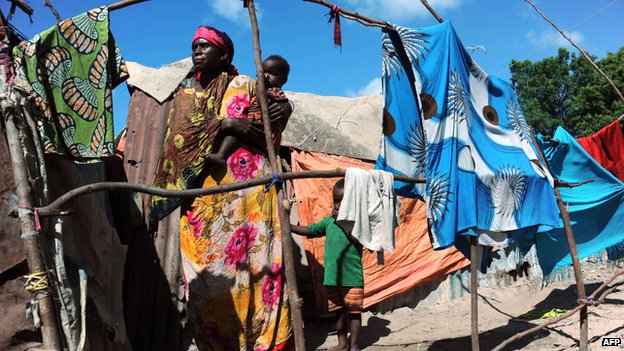 Many people in Africa rely on remittances from relatives in the WestTypically this involves person A in a rich country paying cash to an agent of the transfer firm, be it a bank branch or accredited corner shop.The money is then transferred to a nation in the developing world, where person B goes to another agent of the transfer firm, again typically a bank or shop, or bureau de change, and then withdraws the money in cash. If the money is sent to a bank, it doesn't go directly into a person's account.This is the model that global leaders Western Union and MoneyGram, and their hundreds of smaller rivals, have followed for decades.
Many people in Africa rely on remittances from relatives in the WestTypically this involves person A in a rich country paying cash to an agent of the transfer firm, be it a bank branch or accredited corner shop.The money is then transferred to a nation in the developing world, where person B goes to another agent of the transfer firm, again typically a bank or shop, or bureau de change, and then withdraws the money in cash. If the money is sent to a bank, it doesn't go directly into a person's account.This is the model that global leaders Western Union and MoneyGram, and their hundreds of smaller rivals, have followed for decades.The security concern in this post 9/11 world is whether this system of money transfer is at risk of abuse, such as people using false identification, or trying to launder money.
It is a concern which has cost the big players rather a lot of money in fines. In 2010 Western Union was fined $94m (£60m) by the state of Arizona for not doing enough to prevent money laundering by Mexican drugs gangs, while in 2012 MoneyGram had to pay a $100m penalty.Then last year, UK bank Barclays announced that it was closing the accounts of all but 19 of its 165 clients in the remittance transfer business. Users can send money via WorldRemit's website or mobile phone appTo mitigate such security concerns, on the sending side of remittance transfer WorldRemit only accepts funds electronically via its website or mobile phone app - it doesn't have any agents to whom you can turn up with a big bag of banknotes.Mr Ahmed explains: "Being digital enables us to be as security stringent as possible."We screen all our transactions against sanction lists, and we can pick out suspicious or unusual behaviour almost immediately. For example, when someone tries a number of cards to get one of them to work - no legitimate customer would do that."And we aren't reliant upon a busy shopkeeper to do the security work for us."Mr Ahmed adds that such a digital only approach also enables WorldRemit to charge fees that are less than half those of the big players, a statement which is confirmed when you check its prices against those of the likes of Western Union.
Users can send money via WorldRemit's website or mobile phone appTo mitigate such security concerns, on the sending side of remittance transfer WorldRemit only accepts funds electronically via its website or mobile phone app - it doesn't have any agents to whom you can turn up with a big bag of banknotes.Mr Ahmed explains: "Being digital enables us to be as security stringent as possible."We screen all our transactions against sanction lists, and we can pick out suspicious or unusual behaviour almost immediately. For example, when someone tries a number of cards to get one of them to work - no legitimate customer would do that."And we aren't reliant upon a busy shopkeeper to do the security work for us."Mr Ahmed adds that such a digital only approach also enables WorldRemit to charge fees that are less than half those of the big players, a statement which is confirmed when you check its prices against those of the likes of Western Union.Less cash pick-ups
WorldRemit also says it is at the forefront of digitalising the receiving end of remittance exchanges, with cash pick-ups only accounting for one third of its transactions, compared with 95% for the market as a whole.The other two thirds of WorldRemit transactions see people get paid the money directly to their bank account, or increasingly, to their mobile phone.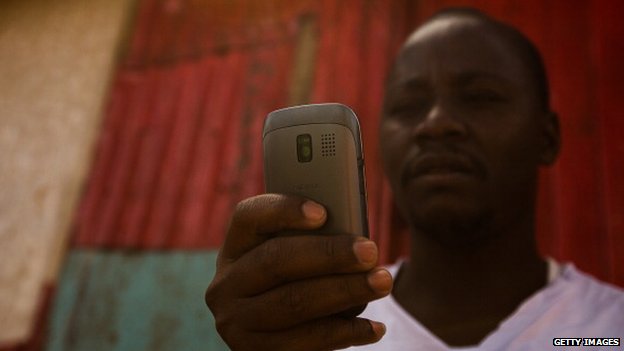 A growing number of Africans are using their mobile phones as cash cardsThe latter has been made possible after WorldRemit signed agreements with mobile phone networks and payment systems such as Ecocash in Zimbabwe, which enable people to use their mobile phones as if they were cash cards.And while the big players in the industry are now also increasingly offering digital transfers and pick-ups, Mr Ahmed says that none yet come close to WorldRemit's global reach.For example, while Moneygram will only allow online transfers to bank accounts in nine countries, at WorldRemit it is more than 50.Mr Ahmed says: "In many countries and cities you have to remember that people don't want to have to be walking around with cash for security reasons."Also it is often a very long walk to the nearest bank, which could be closed."
A growing number of Africans are using their mobile phones as cash cardsThe latter has been made possible after WorldRemit signed agreements with mobile phone networks and payment systems such as Ecocash in Zimbabwe, which enable people to use their mobile phones as if they were cash cards.And while the big players in the industry are now also increasingly offering digital transfers and pick-ups, Mr Ahmed says that none yet come close to WorldRemit's global reach.For example, while Moneygram will only allow online transfers to bank accounts in nine countries, at WorldRemit it is more than 50.Mr Ahmed says: "In many countries and cities you have to remember that people don't want to have to be walking around with cash for security reasons."Also it is often a very long walk to the nearest bank, which could be closed."Growing fast
Mr Ahmed launched WorldRemit in 2010 after first doing a master of business administration (MBA) course at London Business School (LBS), as he said he needed to increase his skills at running a business.While at LBS he successfully pitched his idea to some wealthy investors who bought a stake in the business.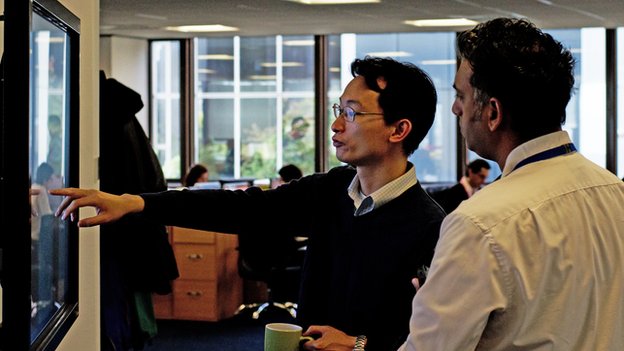 WorldRemit's workforce has grown fast in the past yearAn investment fund has subsequently also come on board.WorldRemit has its headquarters in west London, and this year has seen its workforce triple to 110 people.It currently helps people around the world make 200,000 transfers a month. This is a drop in the ocean compared with Western Union or MoneyGram, but Mr Ahmed says he has the ambition to grow strongly."I'm proud to be making a difference to people's lives," says Mr Ahmed.Source: http://www.bbc.com
WorldRemit's workforce has grown fast in the past yearAn investment fund has subsequently also come on board.WorldRemit has its headquarters in west London, and this year has seen its workforce triple to 110 people.It currently helps people around the world make 200,000 transfers a month. This is a drop in the ocean compared with Western Union or MoneyGram, but Mr Ahmed says he has the ambition to grow strongly."I'm proud to be making a difference to people's lives," says Mr Ahmed.Source: http://www.bbc.com -
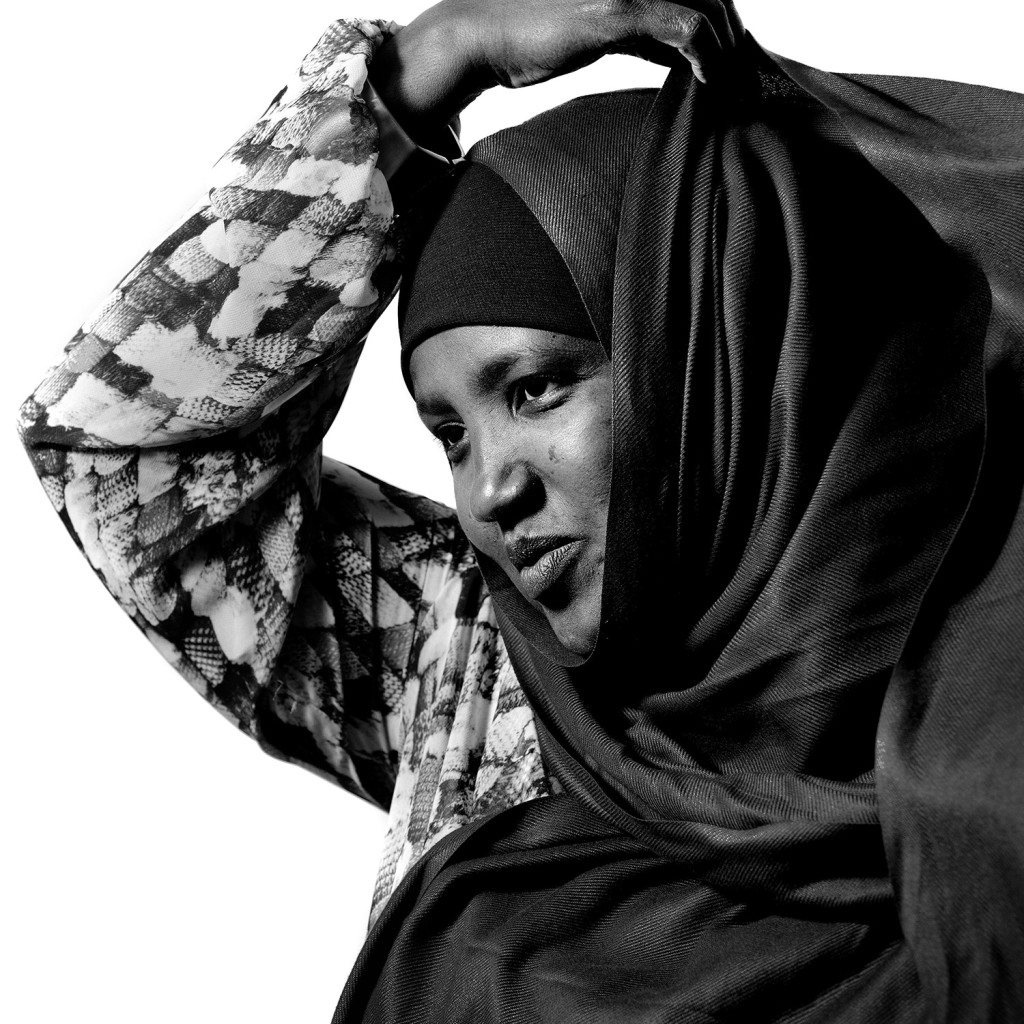 Fatuma Hussein was 12 and visiting relatives when war broke out in her native Somalia in 1991. Her family was forced to flee, winding up in a refugee camp in Kenya.“You would hear so-and-so went missing or this woman was raped last night…horrible, horrible things, experiences you wouldn’t wish on anybody,” Hussein said.It was one of Hussein’s earliest exposures to sexual violence. Later, as a political refugee in Georgia, she and other young women were at the mercy of domineering men. When the girls were threatened, they didn’t even know how to dial 911, she said.“Those are the experiences we carry with us. They’re tough experiences, experiences my daughter, who was born here, will never be able to relate to, never be able to understand,” Hussein said. “They inspire me to do what I do to make sure somebody else’s life will be better.”Now Hussein is a leading voice against gender-based violence in the African immigrant community as the executive director and founder of United Somali Women of Maine. The organization trains advocates with the same backgrounds as the women they serve, bringing familiar language and cultural awareness to immigrant women.“A Sudanese, Somali, Iraqi, Burundi, Angolan – all of those populations we serve – we come from a place that didn’t have a woman’s rights,” Hussein said. “Oppression is still very well exercised in our communities. Our victims, whether men or women, may not be comfortable to come out.”Hussein, the oldest of 13 children, attended a British elementary school in Mogadishu, giving her the foundation necessary to enroll in high school when she arrived in the U.S. in 1993.After graduation, she began raising a family in suburban Atlanta, but got tired of the crime and congestion. She came to Portland in 2001, then moved to Lewiston, where there was then no Somali presence to speak of.“I literally fell in love with Lewiston. It was small, community based,” she said.She was offered a state job working with refugees, but turned it down because she was due to give birth. Instead, she joined a small group of women to start United Somali Women of Maine.“I knew we had vulnerable people. We had a state that was not used to this population,” she said. The organization helped connect people with services but also tackled the taboo subject of gender-based violence.“Domestic and sexual violence has no boundaries,” she said.Source: http://www.pressherald.com
Fatuma Hussein was 12 and visiting relatives when war broke out in her native Somalia in 1991. Her family was forced to flee, winding up in a refugee camp in Kenya.“You would hear so-and-so went missing or this woman was raped last night…horrible, horrible things, experiences you wouldn’t wish on anybody,” Hussein said.It was one of Hussein’s earliest exposures to sexual violence. Later, as a political refugee in Georgia, she and other young women were at the mercy of domineering men. When the girls were threatened, they didn’t even know how to dial 911, she said.“Those are the experiences we carry with us. They’re tough experiences, experiences my daughter, who was born here, will never be able to relate to, never be able to understand,” Hussein said. “They inspire me to do what I do to make sure somebody else’s life will be better.”Now Hussein is a leading voice against gender-based violence in the African immigrant community as the executive director and founder of United Somali Women of Maine. The organization trains advocates with the same backgrounds as the women they serve, bringing familiar language and cultural awareness to immigrant women.“A Sudanese, Somali, Iraqi, Burundi, Angolan – all of those populations we serve – we come from a place that didn’t have a woman’s rights,” Hussein said. “Oppression is still very well exercised in our communities. Our victims, whether men or women, may not be comfortable to come out.”Hussein, the oldest of 13 children, attended a British elementary school in Mogadishu, giving her the foundation necessary to enroll in high school when she arrived in the U.S. in 1993.After graduation, she began raising a family in suburban Atlanta, but got tired of the crime and congestion. She came to Portland in 2001, then moved to Lewiston, where there was then no Somali presence to speak of.“I literally fell in love with Lewiston. It was small, community based,” she said.She was offered a state job working with refugees, but turned it down because she was due to give birth. Instead, she joined a small group of women to start United Somali Women of Maine.“I knew we had vulnerable people. We had a state that was not used to this population,” she said. The organization helped connect people with services but also tackled the taboo subject of gender-based violence.“Domestic and sexual violence has no boundaries,” she said.Source: http://www.pressherald.com -
Thirteen men have been convicted of a string of child sex crimes in Bristol involving the abuse, rape and prostitution of teenage girls.
Bristol Crown Court heard one victim, aged 16, was assaulted by five Somali men after she was moved to the city while in the care of another authority.
Her 14-year-old sister was raped by a member of the gang while visiting her.
The inquiry led to police uncovering another gang of Somali origin who had been abusing four other girls.
The four teenagers were paid £30 or given drugs, alcohol and gifts to perform sex acts on older men from the Somali community.
'Shocked and shaken'
The court heard some were persuaded to have sex with other gang members as they were told by the gang it was Somali "culture and tradition" and "men always have sex with each other's girlfriends".
One 13-year-old victim was raped four times by three different men in a Premier Inn in Bristol city centre.
A statement from the Bristol Somali community said: "The community is deeply shocked and shaken by the outcome of this case. They are unforgivable acts of cruelty against the most vulnerable members of our community."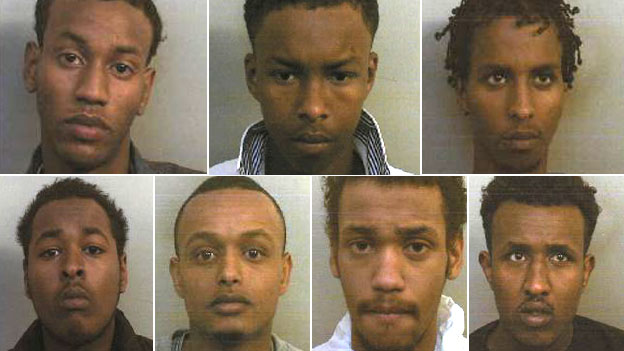 Clockwise from top left: Mohamed Jumale, Said Zakaria, Sakariah Sheikh, Mohamed Dahir, Omar Jumale, Abdirashid Abdulahi and Jusef Abdirizak
Clockwise from top left: Mohamed Jumale, Said Zakaria, Sakariah Sheikh, Mohamed Dahir, Omar Jumale, Abdirashid Abdulahi and Jusef Abdirizak
The thirteen men, all from Bristol, were convicted of charges including rape, sexual activity with a child, facilitating child prostitution, trafficking and paying for the sexual services of a child.
Six were jailed following a trial during the summer. The remaining seven were convicted on Wednesday.
Details of the two cases - which found grooming and abuse dating back to 2011 - can only now be revealed after reporting restrictions were lifted.
The first trial centred on a group of drug dealers from the Easton area and their exploitation of primarily one teenage girl.
She had been moved into a flat on her own in the city and left almost unsupervised by social workers from outside the area.
The second trial focused on another group of young men and their grooming and subsequent sexual abuse of young girls.
Some of the abuse took place at a city centre Premier Inn hotel
Tried in July and sentenced for up to 13 years in jail:- Mustapha Farah, 21, Liban Abdi, 22, and Arafat Osman, 20, were each jailed for 13 years for paying for the sexual services of a child and supplying Class A drugs
- Abdulahi Aden, 20, was jailed for 13 years for rape and supplying Class A drugs
- Mustafa Deria, 22, was found guilty of rape and was jailed for seven-and-a-half years
- Idleh Osman, 22, was jailed for 10 years for facilitating child prostitution and supplying Class A drugs
Tried in November and due to be sentenced on Friday:- Sakariah Sheik, 21, Abdirashid Abdulahi, 21, and Jusuf Abdirizak, 20, were found guilty of rape
- Mohamed Dahir, 22, was found guilty of causing child prostitution
- Omar Jumale, 20, was found guilty of having sex with a child
- Said Zakaria, 22 was found guilty of rape and having sex with a child
- Mohamed Jumale, age 24, was found guilty of sex with a child
Crying under a sink
Speaking in July, Judge Michael Roach said the gang took "considerable advantage" of the 16-year-old sister who had been moved to Bristol by a council, which cannot be named in order to protect her identity.
"I hope there will be an opportunity for the authorities to reconsider their thinking behind such a placement because it has, on any retrospective view, added considerably to the damage of that young person," he said.
The teenager had been ordered by a court to live outside her home area and was placed in "supported living accommodation".
Social workers had "very real concerns" about her and tried to persuade her to leave but "she refused to".
The abused girl's five-month ordeal ended when police went to her flat looking for her sister who had been reported missing.
The 14-year-old sibling was found crying in a cupboard under the kitchen sink in just her underwear.
"One of the women police officers went to speak to her and she said that one of the men had forced himself on her, he had raped her," prosecutor Anna Vigars said in court.
An independent serious case review into her care is now being carried out.
Organisations across Bristol have spoken out against the "unforgiveable" and "abhorrent" acts carried out by 13 men convicted of child sex abuse crimes in the city.
The two gangs of men of Somali origin were convicted at Bristol Crown Court.
Bristol Somali Forum Bristol Somali Forum said those found guilty should be punished to the full extent of the law
Bristol Somali Forum said those found guilty should be punished to the full extent of the law
The community is "deeply shocked and shaken" by the outcome of the case.
"These were unforgivable acts of cruelty against the most vulnerable members of our community," a spokesman for the Bristol Somali Forum said.
"The Muslim communities in Bristol would like to make it absolutely clear we wholeheartedly condemn these dreadful evil acts.
"It is right and appropriate that those responsible and found guilty through our judiciary process are punished to the fullest extent of the law, regardless of who they are."
Esther Keller, Bristol charity Kid's Company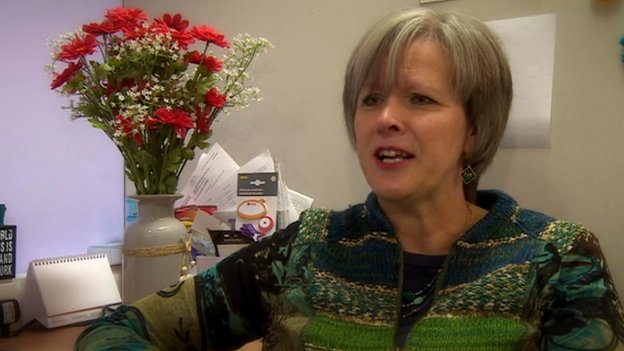 Esther Keller is urging parents to watch out for warning signs of abuse
Esther Keller is urging parents to watch out for warning signs of abuse
Esther Keller, from Bristol charity Kid's Company which supported one of the victims, said the girls had found themselves in a situation "that's not really very savoury".
"Many of the girls involved has some sort of attachment issues and are looking for somebody to care for them and to love them," Ms Keller said.
"In the back of the perpetrator's mind is always this desire to pounce as soon as they think they can.
"They think they're in a very loving caring relationship for the rest of their lives and they can't imagine that these men that are so nice to them are trying to abuse and exploit them.
"Really what I'd urge parents to do, is if your daughter comes home and they suddenly wear nice clothes and [are] given lots of nice gifts by some men; check out what this is about, particularly if they very young."
Children's charity Barnardo's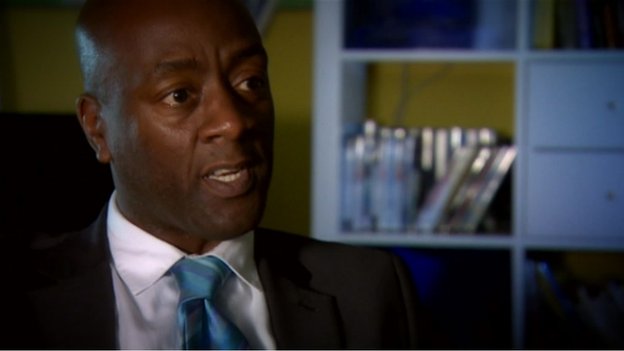 Hugh Sherriffe from Barnardo's said ensuring these cases come to trial is vital
Hugh Sherriffe from Barnardo's said ensuring these cases come to trial is vital
Children's charity Barnardo's said it had worked closely with the police to support the young victims throughout the case.
"The bravery of the victims giving evidence in this case should be commended," regional director Hugh Sherriffe said.
"The courage it takes to re-live your abuse in a courtroom environment cannot be underestimated.
"Ensuring these cases come to trial is vital in giving sexually exploited children confidence in the justice system and the belief that, if they come forward, they will be believed and supported."
Ch Supt Julian Moss, Avon and Somerset Police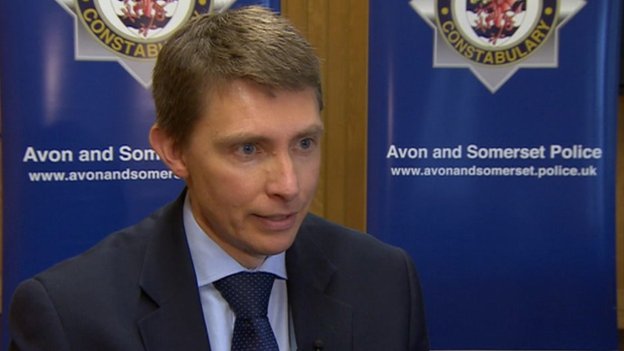 Ch Supt Julian Moss said the men had abused their victims' trust
Ch Supt Julian Moss said the men had abused their victims' trust
Ch Supt Moss said these were "appalling and abhorrent crimes" that have been committed against vulnerable young children.
"I've been humbled by the bravery that these victims have shown," he said.
"They've taken the courageous step of disclosing horrendous offences that have been committed against them and they've shown the strength to give evidence in court.
"Nobody should underestimate how difficult it has been for them to do that.
"One of the ways they've abused trust, is by once they've got this emotional bond with the victims is trying to pretend that their faith dictates that certain behaviour is acceptable - which is rubbish - it's part of the abuse pattern. They're criminals."
Bristol Victim Support The charity described the case as "horrifying"
The charity described the case as "horrifying"
The charity described the case as "horrifying" where vulnerable people, including children, were sexually exploited.
"All the victims spoke to the court via video link so they did not have to face their abusers, with one of our highly trained volunteers to support them.
"My team saw first-hand just how difficult it was for those victims to relive the horrendous ordeal they've been through."
The charity urged anyone affected by sexual abuse or other crime to contact Victim Support for confidential advice and support.
Source: BBC.CO.UK
http://www.somaliaonline.com/somali-gang-in-britain-raped-underage-somali-girls-telling-the-girls-it-is-our-culture-and-tradition/ -
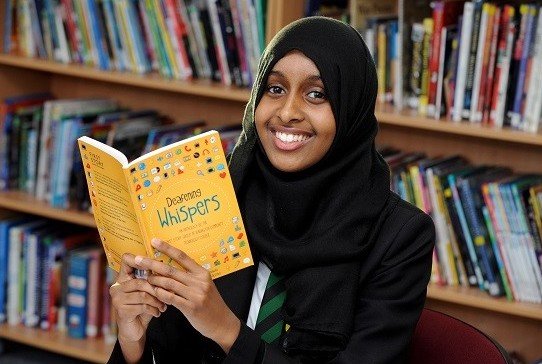 Babington Community College student Hibo Deria was among only four youngsters to attend a special reception at 10 Downing Street last week.The 14-year-old’s dedication and passion for creative writing earned her the invitation to the Prime Minister’s official residence in London via the charity, First Story.She was among 15 pupils from the school in Beaumont Leys who took part in a reading and writing project by the national charity which arranges and pays for acclaimed writers to run creative-writing workshops for students in state schools.Poet John Berkovich worked with Babington pupils and those who took part have had their work published in a professionally produced anthology.The aim of the charity’s work is to encourage youngsters’ love of reading and writing.Hibo’s poetry impressed First Story so much that she was chosen to attend the reception hosted by the chancellor’s wife, Frances Osborne, herself a published author.Hibo, who is of Somali origin, said: “It was amazing to walk through the doors of 10 Downing Street. It’s not something you get to do everyday so I know it’s a once in a lifetime opportunity.“I spoke to Frances Osborne and she congratulated me on my work. I loved being part of First Story. Some of my friends decided to do it and as time went on I started writing more and more poetry and found I really enjoyed it. The workshops we did were lots of fun so I’m definitely going to carry on writing. I don’t write about anything in particular - just whatever inspires me.”Mark Penfold, English as an Additional Language (EAL) coordinator at Babington Community College, accompanied Hibo to the reception.He said: “The charity targets schools in disadvantaged areas and we saw it as an opportunity to expand on all the good work that’s already going on here at Babington.“The reception was originally planned to be in 11 Downing Street but as there was a water leak it was switched to number 10 at the last minute and we couldn’t have been more pleased.“Hibo really took to poetry straight away. All of the sessions take place outside school hours so those taking part have to show a dedication and passion for what they’re doing and that’s exactly what Hibo did.“Students also get to go to various universities and take part in further workshops. Our students visited Oxford and Nottingham universities and it was at Nottingham that Hibo’s work really stood out.”Babington head teacher Denise Newsome said: “This is a wonderful project and something we’ll continue to be part of. Hibo produced some excellent work and we’re delighted that she had this fantastic opportunity to go to Downing Street.”A spokeswoman for First Story said: “First Story was privileged to organise a reception hosted by novelist Frances Osborne - a keen supporter of the charity.“We took this opportunity to invite four students, along with their teachers and headmasters, to represent the four 'hubs' in which we currently run our programme: London, Oxford, the East Midlands and West Yorkshire/Lancashire. Hibo was chosen, along with three other fellow students as she distinguished herself during the year not only by her excellent writing but also her enthusiasm and her motivation.”“We also find that First Story alumni are the best ambassadors for the programme, and we hope that the experience Hibo has had at Downing Street will encourage her to keep on writing and inspire others, thus making ripples throughout her school and her community.”Source: http://www.leicestermercury.co.uk/
Babington Community College student Hibo Deria was among only four youngsters to attend a special reception at 10 Downing Street last week.The 14-year-old’s dedication and passion for creative writing earned her the invitation to the Prime Minister’s official residence in London via the charity, First Story.She was among 15 pupils from the school in Beaumont Leys who took part in a reading and writing project by the national charity which arranges and pays for acclaimed writers to run creative-writing workshops for students in state schools.Poet John Berkovich worked with Babington pupils and those who took part have had their work published in a professionally produced anthology.The aim of the charity’s work is to encourage youngsters’ love of reading and writing.Hibo’s poetry impressed First Story so much that she was chosen to attend the reception hosted by the chancellor’s wife, Frances Osborne, herself a published author.Hibo, who is of Somali origin, said: “It was amazing to walk through the doors of 10 Downing Street. It’s not something you get to do everyday so I know it’s a once in a lifetime opportunity.“I spoke to Frances Osborne and she congratulated me on my work. I loved being part of First Story. Some of my friends decided to do it and as time went on I started writing more and more poetry and found I really enjoyed it. The workshops we did were lots of fun so I’m definitely going to carry on writing. I don’t write about anything in particular - just whatever inspires me.”Mark Penfold, English as an Additional Language (EAL) coordinator at Babington Community College, accompanied Hibo to the reception.He said: “The charity targets schools in disadvantaged areas and we saw it as an opportunity to expand on all the good work that’s already going on here at Babington.“The reception was originally planned to be in 11 Downing Street but as there was a water leak it was switched to number 10 at the last minute and we couldn’t have been more pleased.“Hibo really took to poetry straight away. All of the sessions take place outside school hours so those taking part have to show a dedication and passion for what they’re doing and that’s exactly what Hibo did.“Students also get to go to various universities and take part in further workshops. Our students visited Oxford and Nottingham universities and it was at Nottingham that Hibo’s work really stood out.”Babington head teacher Denise Newsome said: “This is a wonderful project and something we’ll continue to be part of. Hibo produced some excellent work and we’re delighted that she had this fantastic opportunity to go to Downing Street.”A spokeswoman for First Story said: “First Story was privileged to organise a reception hosted by novelist Frances Osborne - a keen supporter of the charity.“We took this opportunity to invite four students, along with their teachers and headmasters, to represent the four 'hubs' in which we currently run our programme: London, Oxford, the East Midlands and West Yorkshire/Lancashire. Hibo was chosen, along with three other fellow students as she distinguished herself during the year not only by her excellent writing but also her enthusiasm and her motivation.”“We also find that First Story alumni are the best ambassadors for the programme, and we hope that the experience Hibo has had at Downing Street will encourage her to keep on writing and inspire others, thus making ripples throughout her school and her community.”Source: http://www.leicestermercury.co.uk/ -
[youtube url=https://www.youtube.com/watch?v=7vJ-SlxjRrQ" controls="0" disablekb="1" hd="1" showinfo="0]A Minneapolis convenience store manager is on a mission to undercut the formidable online recruitment operations of overseas militants.Two years ago, Mohamed Ahmed decided to do something about the slick video pitches. At the time, he was frustrated that young men were slipping out of the United States to join Al-Shabab’s fight in Somalia, lured by messages that he says distort his Muslim faith.
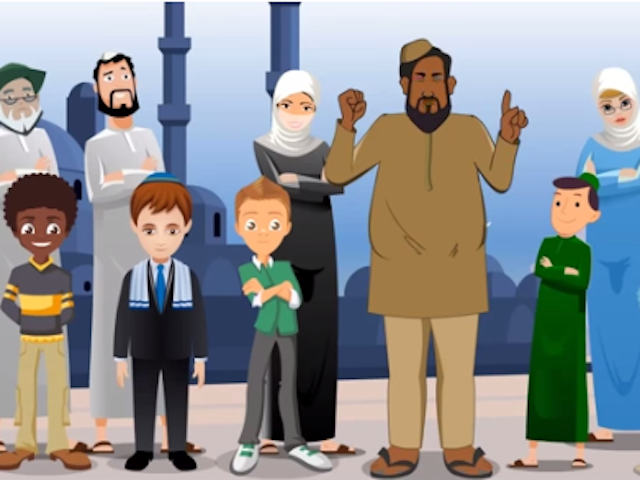 So he started a website, averagemohamed.com, which features cartoons refuting these pitches in the language of what he calls “Generation Simpsons.” The father of four felt renewed urgency after recent news that a small number of Twin Cities residents have left to join the militant group Islamic State of Iraq and the Levant, or ISIL.“It frustrates me that we are unable to take on this ideology,” he said.[youtube url=https://www.youtube.com/watch?v=uoENlZNonqU" controls="0" disablekb="1" hd="1" showinfo="0]Ahmed’s cartoons feature Average Mohamed, a plain-spoken man who mocks and dismisses arguments made by Al-Shabab, ISIL and Boko Haram, the group behind the kidnapping of Nigerian schoolgirls.Take “Flames of Hell,” a parody of the recent trailer for “Flames of War,” an almost hourlong ISIL recruitment movie chock-full of explosions and special effects.“You’d think it’s a ‘Rambo’ film,” Ahmed said. “It’s all glory- and action-packed.”Ahmed’s video counters with less heroic images, such as an ISIL execution of prisoners with bound hands, and a reminder of the Qur’an’s denunciation of killing innocents.Ahmed makes his videos on the cheap, with help from an Indian animator he found online. He hopes he will find backing to bring them to a wider audience. When he heard about a planned federal program to counter youth radicalization in the Twin Cities, he e-mailed the staff of U.S. Attorney Andy Luger.Somali community leader Omar Jamal recently showed the cartoons to his own kids and their friends. He said the videos spurred a lively discussion: What is ISIL? Why do they kill innocent people? Said Jamal, “The only way to fight an idea is with another idea.”source: http://www.startribune.com
So he started a website, averagemohamed.com, which features cartoons refuting these pitches in the language of what he calls “Generation Simpsons.” The father of four felt renewed urgency after recent news that a small number of Twin Cities residents have left to join the militant group Islamic State of Iraq and the Levant, or ISIL.“It frustrates me that we are unable to take on this ideology,” he said.[youtube url=https://www.youtube.com/watch?v=uoENlZNonqU" controls="0" disablekb="1" hd="1" showinfo="0]Ahmed’s cartoons feature Average Mohamed, a plain-spoken man who mocks and dismisses arguments made by Al-Shabab, ISIL and Boko Haram, the group behind the kidnapping of Nigerian schoolgirls.Take “Flames of Hell,” a parody of the recent trailer for “Flames of War,” an almost hourlong ISIL recruitment movie chock-full of explosions and special effects.“You’d think it’s a ‘Rambo’ film,” Ahmed said. “It’s all glory- and action-packed.”Ahmed’s video counters with less heroic images, such as an ISIL execution of prisoners with bound hands, and a reminder of the Qur’an’s denunciation of killing innocents.Ahmed makes his videos on the cheap, with help from an Indian animator he found online. He hopes he will find backing to bring them to a wider audience. When he heard about a planned federal program to counter youth radicalization in the Twin Cities, he e-mailed the staff of U.S. Attorney Andy Luger.Somali community leader Omar Jamal recently showed the cartoons to his own kids and their friends. He said the videos spurred a lively discussion: What is ISIL? Why do they kill innocent people? Said Jamal, “The only way to fight an idea is with another idea.”source: http://www.startribune.com -
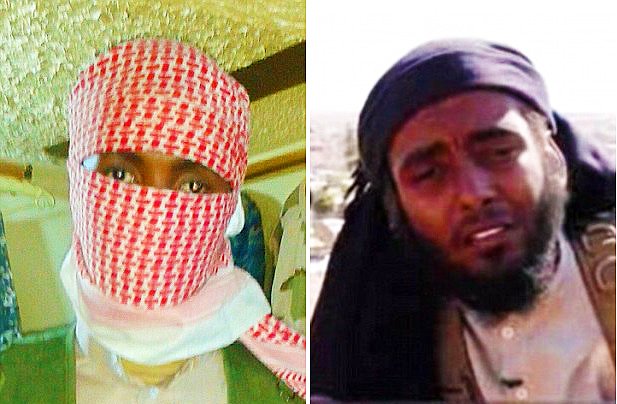 Two British nationals reportedly have been killed fighting for the Islamic State in the Kurdish town of Kobane located near the Syria-Turkey border.The two dead ISIS fighters from Britain have been identified as Abu Abdullah al-Habashi (21) and Abu Dharda (20). Their deaths were reported on ISIS affiliate accounts.The Foreign and Commonwealth Office has also affirmed the report stating that it was aware about the reports of the death of two British nationals in Syria.However, the FCO spokesperson told The Guardian that since the country "does not have any representation in Syria, it is extremely difficult to get any confirmation of deaths or injuries and our options for supporting British nationals there are extremely limited."Al-Habashi, who also goes by the name of name of Abu Abdullah al-Britani, was brought up in in north London in a Christian Eritrean family. He converted to Islam when he was 16.Al-Habashi has made appearances in at least two ISIS propaganda videos posted online by the extremist group. Al Habashi reportedly told the BBC in August that he was at the "forefront" of fighting and said that he one of the few jihadists from Britain who had the 'honour' of fighting for ISIS both in Iraq and Syria.His family also reportedly had tried to convince him to return home, but he told them off saying that "He had to stay back to fight for Allah."Earlier last month, Al-Habashi made headlines after he featured in an ISIS propaganda video alongside a German and a French jihadi fighter. The video titled 'Wait. We are also waiting,' had given out some strong threats to the West. "We are waiting for you in Dabiq. We are waiting for you in Iraq. So bring your coalition of unbelievers because unbelievers will not help you. We will take their weaponry as booty and these people will die."He then went on to add: "We will chop off the heads of the Americans. We will chop off the heads of the French, chop of the heads of whoever you may bring." He even promised that the black flag of the Islamic State will eventually be on the White House."The second ISIS recruit from UK, Dharda, is a British-Somali who grew up in west London.According to the BBC, Dharda was believed to have been questioned by counter-terrorism police at a British airport as he travelled towards Syria back in 2013. However, he was allowed to continue his journey as the officers were satisfied with the explanation he gave for the purpose of his trip.Source: http://www.ibtimes.co.inTwo British jihadis have been killed in Kobane fighting for ISIS. Twitter
Two British nationals reportedly have been killed fighting for the Islamic State in the Kurdish town of Kobane located near the Syria-Turkey border.The two dead ISIS fighters from Britain have been identified as Abu Abdullah al-Habashi (21) and Abu Dharda (20). Their deaths were reported on ISIS affiliate accounts.The Foreign and Commonwealth Office has also affirmed the report stating that it was aware about the reports of the death of two British nationals in Syria.However, the FCO spokesperson told The Guardian that since the country "does not have any representation in Syria, it is extremely difficult to get any confirmation of deaths or injuries and our options for supporting British nationals there are extremely limited."Al-Habashi, who also goes by the name of name of Abu Abdullah al-Britani, was brought up in in north London in a Christian Eritrean family. He converted to Islam when he was 16.Al-Habashi has made appearances in at least two ISIS propaganda videos posted online by the extremist group. Al Habashi reportedly told the BBC in August that he was at the "forefront" of fighting and said that he one of the few jihadists from Britain who had the 'honour' of fighting for ISIS both in Iraq and Syria.His family also reportedly had tried to convince him to return home, but he told them off saying that "He had to stay back to fight for Allah."Earlier last month, Al-Habashi made headlines after he featured in an ISIS propaganda video alongside a German and a French jihadi fighter. The video titled 'Wait. We are also waiting,' had given out some strong threats to the West. "We are waiting for you in Dabiq. We are waiting for you in Iraq. So bring your coalition of unbelievers because unbelievers will not help you. We will take their weaponry as booty and these people will die."He then went on to add: "We will chop off the heads of the Americans. We will chop off the heads of the French, chop of the heads of whoever you may bring." He even promised that the black flag of the Islamic State will eventually be on the White House."The second ISIS recruit from UK, Dharda, is a British-Somali who grew up in west London.According to the BBC, Dharda was believed to have been questioned by counter-terrorism police at a British airport as he travelled towards Syria back in 2013. However, he was allowed to continue his journey as the officers were satisfied with the explanation he gave for the purpose of his trip.Source: http://www.ibtimes.co.inTwo British jihadis have been killed in Kobane fighting for ISIS. Twitter -
The Second Africa-Turkey Summit held in Malabo, Equatorial Guinea from Nov. 19 to Nov. 21 heralds the beginning of a new phase in Turkish-African relations. Turkey's "opening to Africa" policy that began in 1998 is now maturing into a full-fledged Turkey-Africa partnership strategy. As the second summit shows, the potential between Turkey and Africa is growing by the day and bearing fruit already. In its long and rich history, Africa has been many things. It has created great cultures and civilizations, it has been an exemplary model of cultural and religious pluralism and it has fought against colonialism and won its independence.
But Africa has also been colonized, exploited, enslaved and violated. It has seen colonialism, brute capitalism, civil wars, corruption, underdevelopment, poverty, epidemics and other problems. Today, despite their young population and rich natural resources, many African nations are struggling with political and economic problems. Yet a new page in Africa's modern history is being turned. Many parts of Africa are once again becoming centers of education, trade, culture and art. Some African countries already have political stability, sustainable economic development, democratic participation and cultural and political pluralism. As the second largest continent on earth with more than a billion people, Africa, together with Asia, is the new rising star of the 21st century.
Having long historical relations with African countries, Turkey is expanding its relations with African nations in both the north and the south of the continent. Turkey's "opening to Africa" policy has come a long way over the last 16 years. Ten years ago, Turkey had only 12 embassies in Africa. Today, it has 39 and the next Turkish embassy will be opened in Equatorial Guinea next year. Likewise, African nations had only a handful of embassies in the Turkish capital Ankara until recently. Today, 30 African nations have embassies in Turkey. The Turkish Cooperation and Coordination Agency (TİKA) now has offices in 12 African capitals and provides technical assistance and carries out hundreds of small and medium-size projects in more than 30 African countries. In 2012 and 2013, Turkey contributed around $800 million to various aid programs in Africa. This amounts to about one third of Turkey's annual development aid. When Turkey hosted the 4th U.N. Conference on the Least Developed Countries in Istanbul on from May 9 to May 13, 2011, it set as a goal to help alleviate poverty in more than 30 African countries that are among the least developed countries of the world.
A good example of this political vision and determination is Turkey's efforts in Somalia. A few years ago Turkey led an international campaign to help Somalia in one of its worst moments in modern history. By mobilizing its resources to fight against famine and disease and calling on the international community for help, Turkey contributed millions of dollars in aid and helped Somalis establish a certain degree of security and economic infrastructure. With Turkey's push, other countries and organizations including the U.N. and the Organization of Islamic Cooperation also came to Somalia's help. Today, Somalia still faces major challenges including the effects of its civil war, the absence of a strong central government and poor infrastructure. But it is also making steady progress in various areas that have been neglected for decades. Turkey is still acting as a helping hand. As one journalist put it, Turkey is not simply aiding Somalia, it is "building a new country" there.
Turkey's work in Somalia is part of its new vision to foster and deepen relations with African countries. In recent years, high-level visits, diplomatic relations, investment and trade, cultural and educational programs, scholarships, tourism, summits, medical programs have added a new breadth and depth to Turkish-African relations. In 2008, the African Union declared Turkey a "strategic partner." The same year, Turkey hosted the first Africa-Turkey Cooperation Summit in Istanbul.
In 2002, Turkey's total trade with Africa was less than $3 billion. Today, the trade volume has reached $25 billion. Turkish Airlines flies to about 40 points in more than 30 African countries. The first Turkey-Africa Media Forum held in May 2012 in Ankara brought together over 300 African journalists from 54 African countries. Hundreds of Turkey scholarships have been offered to African students over the last 10 years. Turkey's strategic partnership with Africa is in line with Turkey's multi-dimensional foreign policy outlook. It is also in tune with the perspective of "African solutions to African problems" - a perspective that seeks to overcome Africa's colonialist history without creating new types of colonialism and political and economic dependence.
The rich and powerful countries of the world should help African nations to reach political independence, human security and economic development rather than follow policies that deepen political instability and economic dependence. What Africa needs today is not more exploitation, but fairness and opportunity.
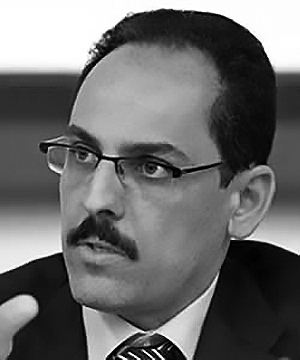 Ibrahim Kalin is chief policy advisor to Turkish Prime Minister, Recep Tayyip Erdogan, and is a fellow at Georgetown University's Prince Alwaleed bin Talal Center for Muslim-Christian Understanding. Kalin previously taught at the College of the Holy Cross. Kalin founded the SETA Foundation for Political, Economic and Social Research in Ankara, Turkey, serving as director from 2005 to 2009. He is the author of Knowledge in Later Islamic Philosophy: Mulla Sadra on Existence, Intellect, and Intuition (2009), as well as numerous articles and essays. Kalin earned an M.A. from the International Islamic University of Malaysia and a Ph.D. from George Washington University. He was one of the original signatories of A Common Word Between Us and You, a letter addressed to Christian leaders in an appeal for peace and cooperation between the two religions.
Ibrahim Kalin is chief policy advisor to Turkish Prime Minister, Recep Tayyip Erdogan, and is a fellow at Georgetown University's Prince Alwaleed bin Talal Center for Muslim-Christian Understanding. Kalin previously taught at the College of the Holy Cross. Kalin founded the SETA Foundation for Political, Economic and Social Research in Ankara, Turkey, serving as director from 2005 to 2009. He is the author of Knowledge in Later Islamic Philosophy: Mulla Sadra on Existence, Intellect, and Intuition (2009), as well as numerous articles and essays. Kalin earned an M.A. from the International Islamic University of Malaysia and a Ph.D. from George Washington University. He was one of the original signatories of A Common Word Between Us and You, a letter addressed to Christian leaders in an appeal for peace and cooperation between the two religions. -
The felony theft charge against Hashim Yonis arose from a politically motivated attempt to keep him from being elected to the Minneapolis Park and Recreation Board, his attorney asserted Tuesday in opening arguments in his trial.The accusation represents the first glimpse of the defense that Yonis plans to offer against the charge that he rented a Currie Park field and pocketed the money. Until the accusation surfaced, Yonis worked for both the park and school districts. The refugee from the Somali civil war was taken by former Mayor R.T. Rybak
to meet President Obama and tout the city's STEP-UP youth job and mentoring program. School SuperintendentBernadeia Johnson also cited his work.His lawyer, Ira Whitlock, argued that "this is a case about false accusations of theft" designed to keep the man park Commissioner Scott Vreeland testified was "a rising star" from displacing incumbent commissioners in 2013. Vreeland was called by prosecutor Susan Crumb.Whitlock did not identify who specifically was behind what he described as a political conspiracy. Vreeland was one of several recipients of community complaints about weekend field rentals to adult Latino teams instead of predominantly East African youth teams from the Cedar Riverside neighborhood.But although Vreeland represents the area as district commissioner, Yonis was running for an at-large seat in a different race. John Erwin, an at-large park commissioner who was also running for re-election, also got the complaint about rentals, Vreeland said. Erwin is on the list of potential witnesses for Yonis in the trial but Whitlock said he'd been unable to interview Erwin. Erwin said late Tuesday that he wasn't aware of any attempts to reach him.Crumb asserted that Yonis repeatedly accepted money to rent the Currie field from Moises Hernandez, representing the Latino teams. She said the field rent was paid in cash in an outbuilding at Currie, but Hernandez was given no receipt. She said that once Vreeland confronted Yonis about the rentals, Yonis tried to cover his tracks. He turned over some money and tried to get another employee to backdate a receipt, she said. Whitlock said that Yonis was never trained by his supervisors about procedures for turning over money and issuing receipts.The trial may hinge on the credibility of Hernandez. Crumb said his wife and stepdaughter also witnessed the cash rentals by Yonis for weekend rentals that began in early May. But Whitlock said that Hernandez has given inconsistent statements, and that a park employee found that he owed the Park Board $13,000, a debt that Whitlock said in an interview was for field rentals and later was erased. He argued that influenced the statement Hernandez gave an investigator.Vreeland testified that he got an e-mail with a petition signed by 77 people complaining about the weekend rentals. He said he'd known Yonis for about five years, worked with him on organizing projects and found his multi-lingualism and contacts an asset.Source: http://www.startribune.com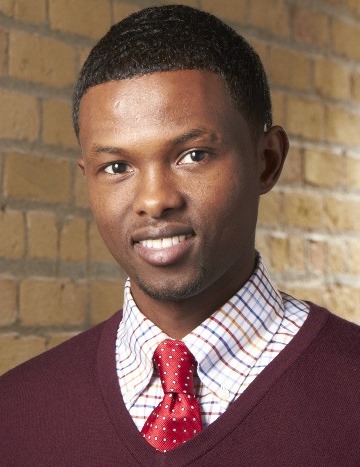
-
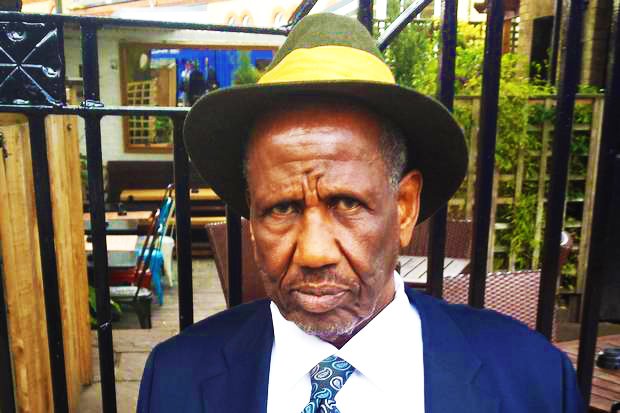 A receptionist who was allegedly called a “black slave” and hit by a senior official at the Qatari embassy in Mayfair in a campaign of racial bullying says he is seeking £100,000 in damages because he fears he may never work again.The Standard reported in June how Mohamoud Ahmed, 74, had lodged a claim for unfair dismissal and race and age discrimination against the Gulf state’s embassy, where he had been employed for almost 20 years.Somali-born Mr Ahmed, who has lived in the UK for more than 40 years and is a British citizen, claims he was referred to in Arabic as a “donkey” and a “dog” by Abdullah Al-Ansari, the head of the embassy’s medical department. All his claims are denied by the Qatari embassy and Mr Al–Ansari.A judge at a central London employment tribunal stayed the case until the Court of Appeal rules on a test case over whether embassies can claim diplomatic immunity against such actions. The case involves Fatima Benkharbouche, a cook at the Sudanese embassy, and Minah Janah, a nanny at the Libyan embassy. It is due to be heard on November 25.Mr Ahmed, who claims he was assaulted on two occasions by Mr Al-Ansari, told the Standard he has had eight months of physiotherapy and may need surgery on his left shoulder, but is still looking for work.He said: “It has been over a year now since I was unfairly dismissed from the job in which I had worked at for almost 20 years. I have no doubt that this was due to the colour of my skin, race and age … I have been left jobless, and as a formerly working pensioner, I am struggling to find work.”The father-of-nine said he hopes the Court of Appeal ruling will go in his favour so his case can be heard at tribunal. He added: “The Qatari embassy must be made accountable for the acts of their diplomat who has acted in such a grotesque manner.”Mr Ahmed’s lawyer, Matthew Hodson, of Levenes Employment solicitors, said: “The issue before the Court of Appeal is the right to a fair trial. This is fundamental to the rule of law, should be absolute and in no circumstances should it be limited.“Surely, it cannot therefore be correct that those working in foreign embassies are not afforded this right.”A Qatari embassy spokesman said: “Mr Ahmed’s allegations are utterly untrue. He was at no time ill-treated, abused or discriminated against by anyone at or representing the embassy. It is certainly not true that Mr Ahmed was discriminated against because of his colour.”He added: “Mr Ahmed’s wish to receive £100,000 in compensation has not been communicated either to the embassy or, as far as I am aware, to the tribunal. It is contradicted by previous communications that have been made by Mr Ahmed and by his solicitors.“Mr Ahmed was not dismissed. He resigned and thus brought his present status on himself.”source: http://www.standard.co.uk
A receptionist who was allegedly called a “black slave” and hit by a senior official at the Qatari embassy in Mayfair in a campaign of racial bullying says he is seeking £100,000 in damages because he fears he may never work again.The Standard reported in June how Mohamoud Ahmed, 74, had lodged a claim for unfair dismissal and race and age discrimination against the Gulf state’s embassy, where he had been employed for almost 20 years.Somali-born Mr Ahmed, who has lived in the UK for more than 40 years and is a British citizen, claims he was referred to in Arabic as a “donkey” and a “dog” by Abdullah Al-Ansari, the head of the embassy’s medical department. All his claims are denied by the Qatari embassy and Mr Al–Ansari.A judge at a central London employment tribunal stayed the case until the Court of Appeal rules on a test case over whether embassies can claim diplomatic immunity against such actions. The case involves Fatima Benkharbouche, a cook at the Sudanese embassy, and Minah Janah, a nanny at the Libyan embassy. It is due to be heard on November 25.Mr Ahmed, who claims he was assaulted on two occasions by Mr Al-Ansari, told the Standard he has had eight months of physiotherapy and may need surgery on his left shoulder, but is still looking for work.He said: “It has been over a year now since I was unfairly dismissed from the job in which I had worked at for almost 20 years. I have no doubt that this was due to the colour of my skin, race and age … I have been left jobless, and as a formerly working pensioner, I am struggling to find work.”The father-of-nine said he hopes the Court of Appeal ruling will go in his favour so his case can be heard at tribunal. He added: “The Qatari embassy must be made accountable for the acts of their diplomat who has acted in such a grotesque manner.”Mr Ahmed’s lawyer, Matthew Hodson, of Levenes Employment solicitors, said: “The issue before the Court of Appeal is the right to a fair trial. This is fundamental to the rule of law, should be absolute and in no circumstances should it be limited.“Surely, it cannot therefore be correct that those working in foreign embassies are not afforded this right.”A Qatari embassy spokesman said: “Mr Ahmed’s allegations are utterly untrue. He was at no time ill-treated, abused or discriminated against by anyone at or representing the embassy. It is certainly not true that Mr Ahmed was discriminated against because of his colour.”He added: “Mr Ahmed’s wish to receive £100,000 in compensation has not been communicated either to the embassy or, as far as I am aware, to the tribunal. It is contradicted by previous communications that have been made by Mr Ahmed and by his solicitors.“Mr Ahmed was not dismissed. He resigned and thus brought his present status on himself.”source: http://www.standard.co.uk
http://www.somaliaonline.com/somali-employee-sues-the-qatari-embassy-in-the-uk-after-he-was-allegedly-beat-up-and-called-a-donkey-and-a-dog-by-embassy-official/


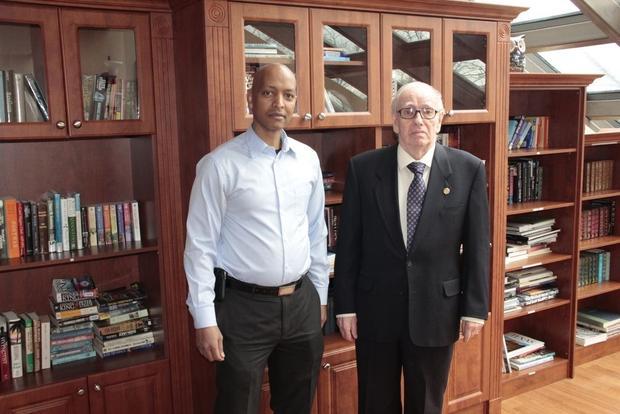
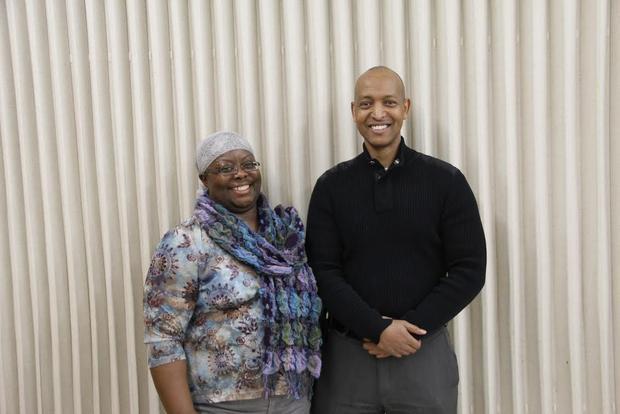
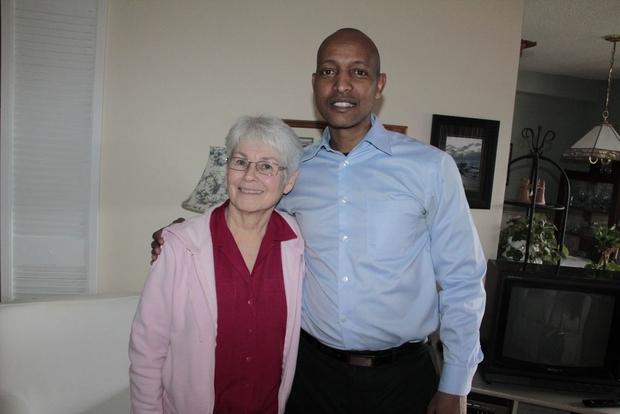
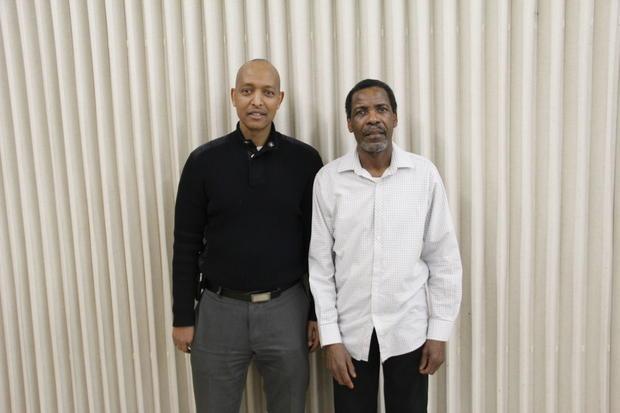
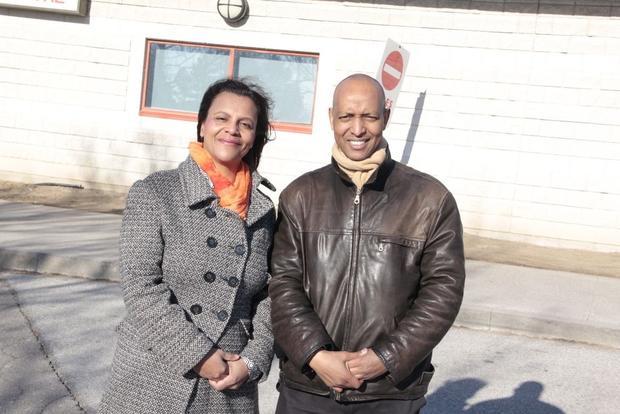
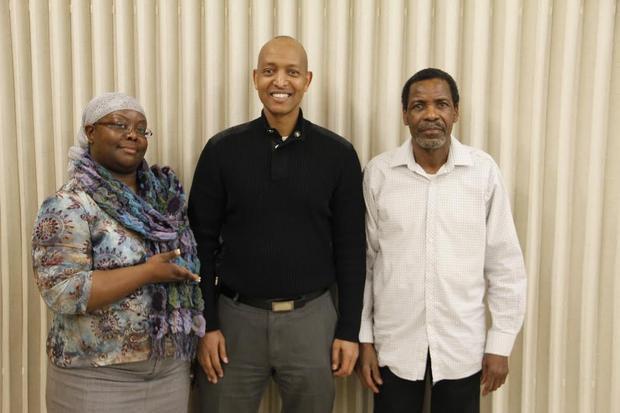
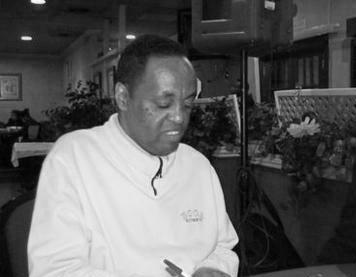
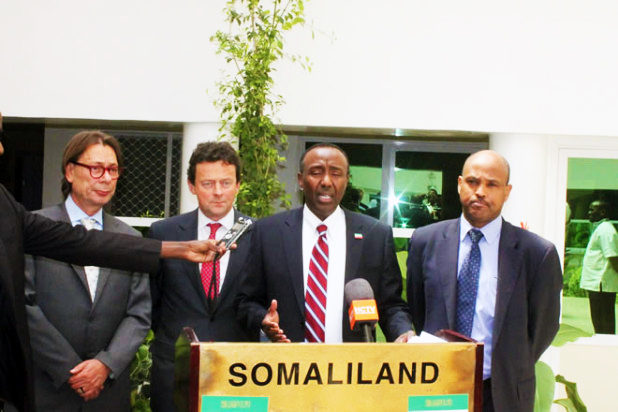
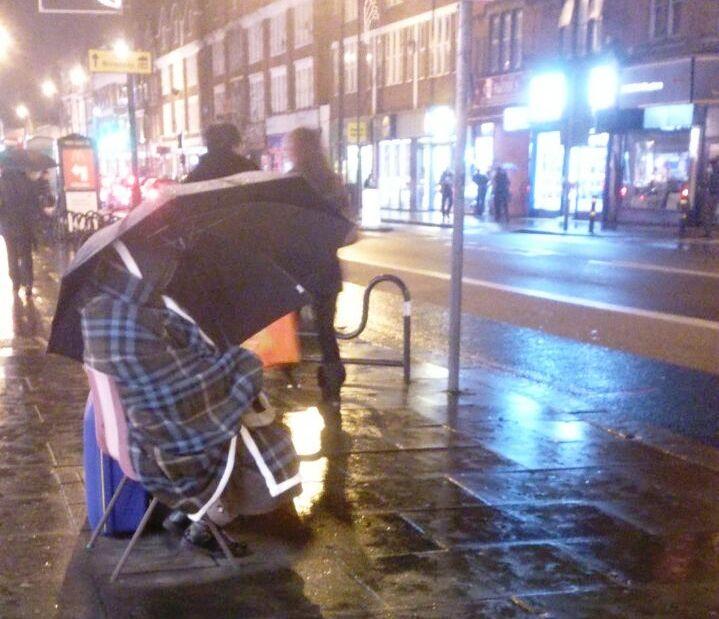
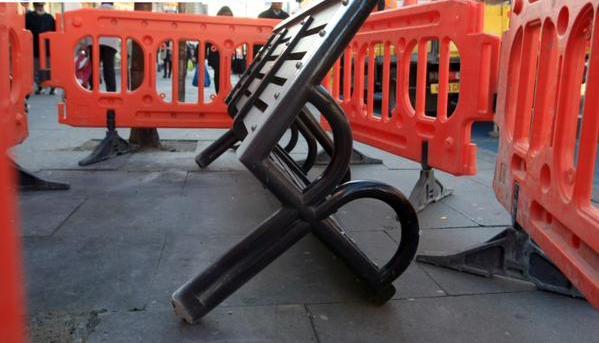
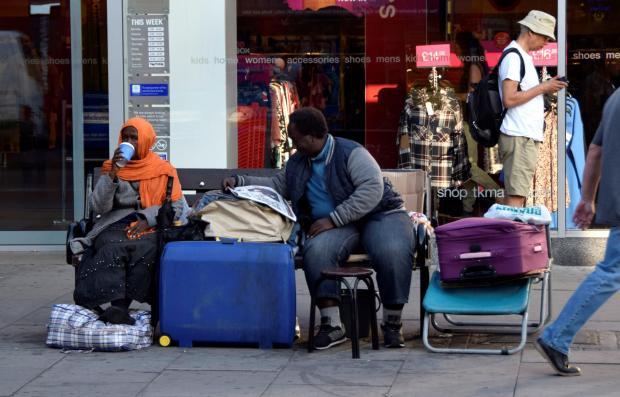
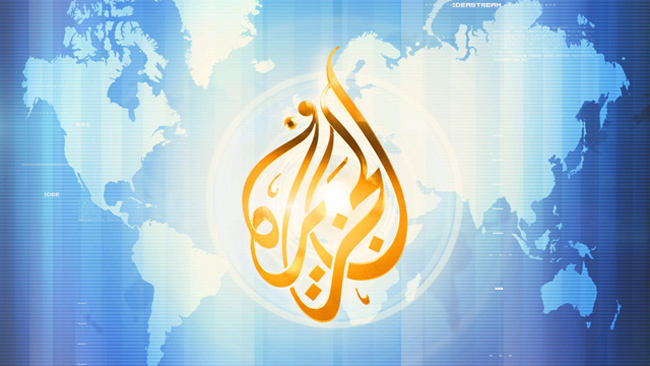
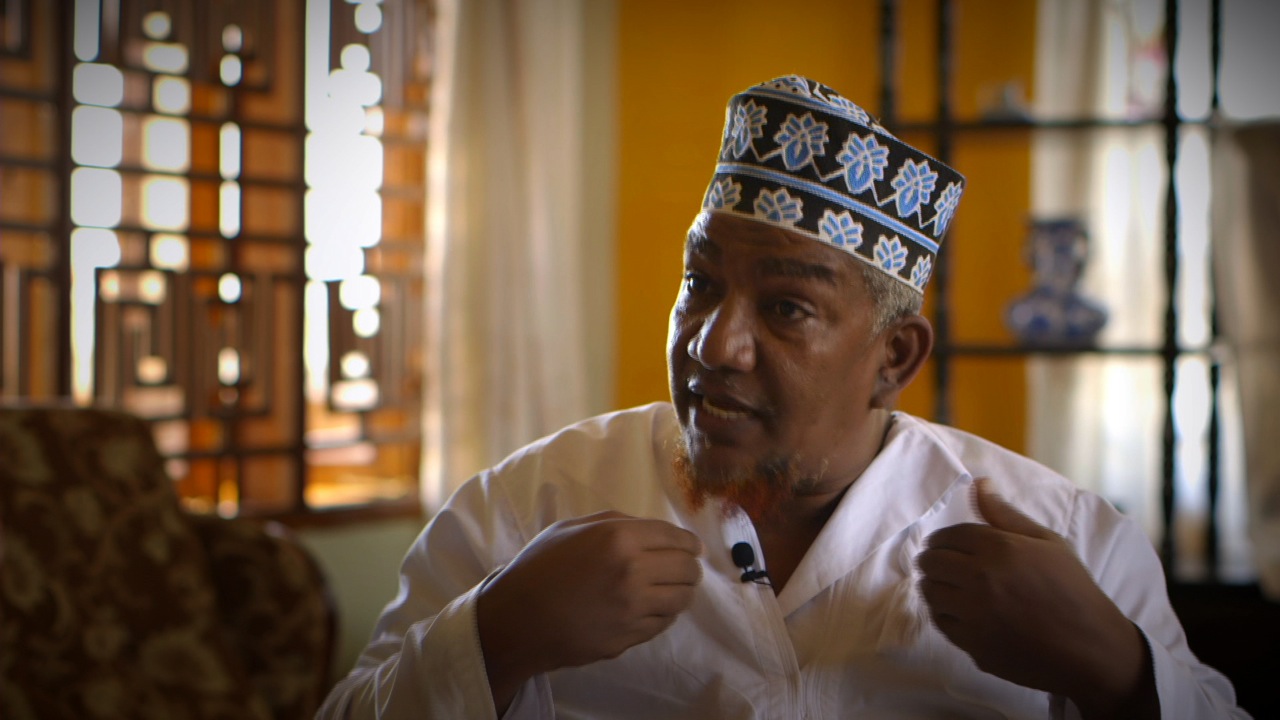


While Kenya’s coast has been experiencing violent attacks, Swahili resort town of Malindi has largely been spared from the violence.
in General
Posted
Most people who move to Malindi, a small, sleepy resort town on Kenya’s coast, are exiles of one sort or another. The Italians, who form a sizeable proportion of the population, are escaping from the stifling routine and order of Europe. Some, they say, are fugitives, evading the law in their own country. The British pensioners who live here are running away from the cold and the prospect of spending old age in a miserable home for the elderly in Britain. Kenyans from other parts of the country, like myself, come to escape the rat race, crime and gridlocks that have come to define my birthplace Nairobi, Kenya’s political and commercial capital.Kenya’s coastal strip has over the centuries attracted seafarers, slave traders, adventurers and merchants from as far as India, China and the Arab peninsula. Its unique blend of African, Arab and Indian culture dates back several centuries and is said to extend from Mogadishu in Somalia to Cape Delgado in Mozambique. Malindi, like Mombasa, Mogadishu, Lamu, Pate and Zanzibar, was once a leading mercantile centre, part of the Indian Ocean sea routes that linked the African hinterland to Asia. Its Muslim population, mostly Swahilis who have been inhabiting the East African coast for centuries, can be found in the older historic part of the town known as Shela, where the Portuguese explorer Vasco da Gama set up base in the 15th century, and from where he is said to have recruited a pilot to steer his ship towards India.In more recent years, foreign tourists have been coming to Malindi to enjoy the sun, the sea and sex. The town’s beaches have gained a seedy and decadent reputation as places where European billionaires, including the playboy former Italian Prime Minister Sylvio Berlosconni, come to play. However, this tourist season, the bars, restaurants, casinos and beach hotels in Malindi are almost empty. An Ebola outbreak in West Africa and a spate of violent incidents that resulted in the death of dozens of people in Lamu County north of Malindi have scared off foreigners. The attacks appeared to be land-related, pitting indigenous ethnic groups against those they view as “outsiders,” even though Al Shabaab, a Somalia-based terrorist organization that has links to Al Qaeda, took responsibility for the massacres. Lamu Island, a World Heritage Site known for its unique Swahili architecture, culture and lifestyle and its pristine beaches, has seen a dramatic reduction in tourists this season, largely due to a dawn-to-dusk curfew imposed by the government.While Kenya’s coast has been experiencing violent attacks in recent years, which the government largely attributes to a proscribed secessionist group called the Mombasa Republican Council and radicalised Muslim youth, Malindi has largely been spared from the violence that has now come to be associated with places such as Mombasa and Lamu. Its relatively large population of pleasure-seeking Europeans appears to co-exist quite happily with its conservative Muslim population and its deeply impoverished indigenous Giriama people. In Malindi, it is not unusual to see a local woman clad in black bui bui (full-body veil) walking besides a half-naked Italian woman in a see-through dress with a bikini underneath. This kind of tolerance, also unique to Kenya’s coast, is unimaginable in many parts of the Muslim world.Unlike Nairobi, which has a reputation of being one of the most dangerous cities in the world, hence earning the name “Nai-robbery”, violent crime is quite rare here. In Nairobi, people drive with their car windows and doors firmly locked for fear of carjacking. Here, you can park your car with all windows open and find the groceries you left in the back seat untouched. Some say it has to do with the strict Sharia law practised by local Muslims; others say that the locals have not yet been tainted by the greed and dysfunction of Kenya’s big cities.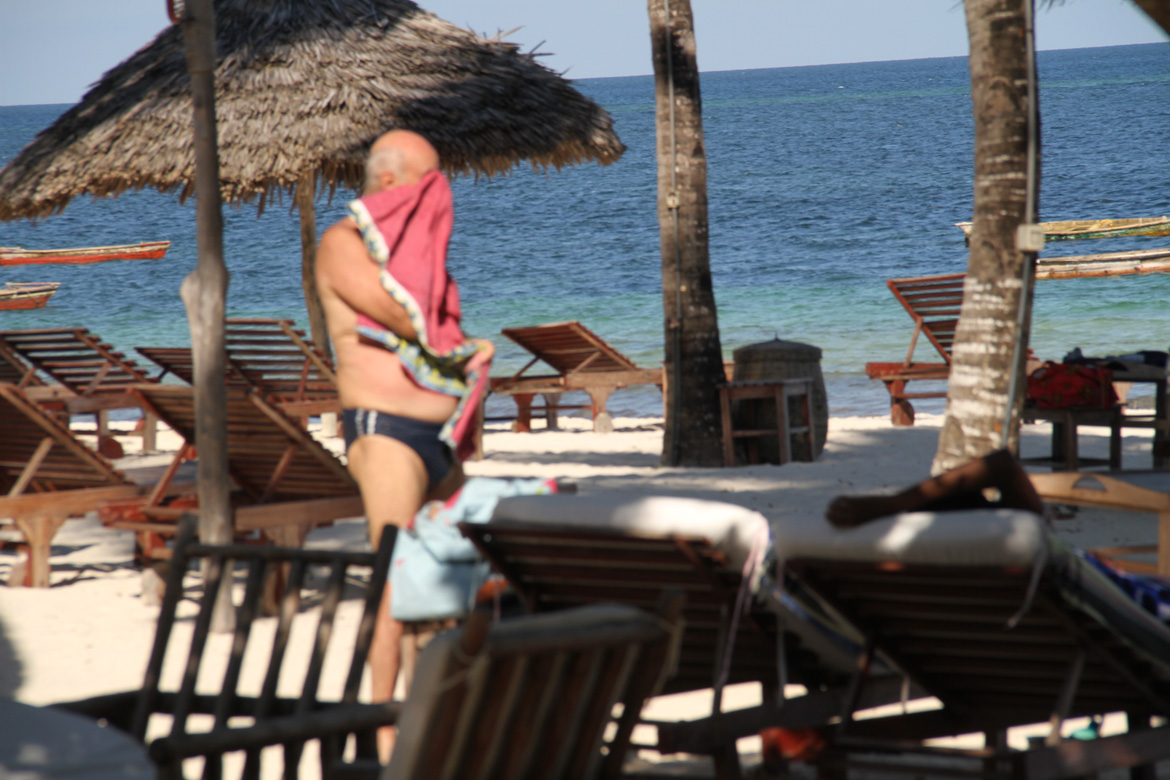
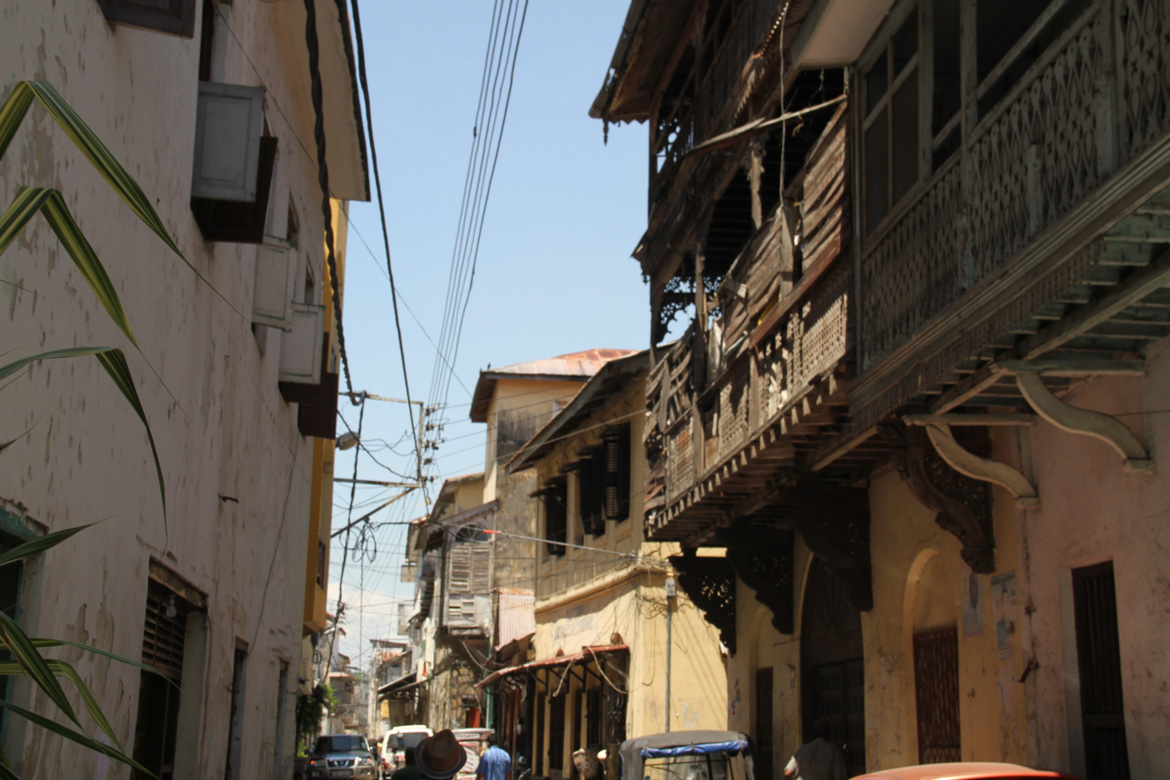 The generally relaxed atmosphere in this town, which is about an-hour-an-a half’s drive from Mombasa, Kenya’s second largest city and leading beach resort, was shattered quite unexpectedly in the early hours of Sunday November 4th, 2014, when a group of 20 or so young men wearing blue bandanas and black shirts tried unsuccessfully to invade and destroy a police camp with guns and machetes. At around the same time, another group, similarly dressed, attacked an army barracks in Mombasa. Most of the Mombasa attackers were repelled and killed, but two managed to escape.The government, predictably, blamed the Mombasa Republican Council, a rag tag group made up mostly of poor peasants, whose secessionist slogan “Pwani si Kenya” (The Coast is not Kenya) has been causing considerable alarm within this and previous governments. While the current administration paints the group as a violent organization with jihadist ambitions, others are of the view that the MRC is a peasant or class-based movement that is seeking to redress government neglect of the coastal region, which remains one of the most impoverished regions in the country, despite tourism. Some also believe that this and other groups could be part of a wider insurgency that is being fuelled by radical Muslim clerics inspired by Al Shabaab.While Kenya has experienced sporadic violence in the past, the epicentre of the violence has tended to be in the scenic Rift Valley, where politically-instigated ethnic clashes have been a feature of nearly every election since 1992. The most violent of these clashes took place after the 2007 elections, when more than 1,000 people were killed and around 600,000 people were displaced. The current president Uhuru Kenyatta and his deputy William Ruto are currently facing charges of crimes against humanity related to that violence at the International Criminal Court at The Hague.The rather daring and bizarre recent attacks in Malindi and Mombasa point to a new phenomenon that has become more widespread in the coastal region in recent years – that of radicalisation combined with increasing rebellion and discontent among marginalised and impoverished coastal communities who appear to be taking up arms against the state. Add to this mix the threat of Al Shabaab, which staged a daring terrorist attack on Nairobi’s posh Westgate mall in September last year, and you have a lethal cocktail of local insurgencies combining forces with international terror networks.For decades, Kenya’s coastal communities have complained of state neglect. Landlessness and poverty are endemic in the region. Successive regimes, including Omani sultans in the 19th century, British colonialists and post-independence leaders, have been accused of grabbing land and rendering the local Mijikenda and Swahili populations poor and homeless. Al Shabaab, which promised to bring its war to Kenya after the country invaded Somalia in 2011, ostensibly to eject the terrorist organisation from Somali soil, appears to have found ready recruits among Kenya’s coastal youth. Last week, Kenyan security forces raided several mosques in Mombasa which they claimed were jihadist hotbeds. One youth was killed and 251 were arrested during the operation. A few days later, Al-Shabaab militants carried out an attack on a Nairobi-bound bus, killing 28 passengers. The group claimed it was in retaliation for the mosque raids. And earlier this year, Abubakar Shariff, a fiery Kenyan Muslim cleric, was shot and killed by unknown assailants outside a law court in Mombasa. Shariff, also known as Makaburi, had been blacklisted by the United States over his alleged links to global jihadists. After the Westgate attack, he is reported to have stated that Al Shabaab was justified in killing Kenyans because the Kenyan forces in Somalia had done the same to Somalis. He was the third radical Muslim cleric to have been killed in two years. Most Kenyans believe that these killings were sanctioned by the government, though the government has denied any knowledge of who was behind the murders.Insecurity not just in coastal areas, but in other marginalized regions of the country, particularly in northern Kenya, where vast reserves of oil have been discovered, seems to be escalating. Not too long after the Malindi and Mombasa attacks, Pokot bandits killed 22 police officers in Turkana county in northern Kenya. Conflict over resources between the Pokot and Turkana ethnic groups were blamed for these killings. The government, on cue, sent out a military mission to inflict what the Pokots view as “collective punishment” on Pokot villages. Houses were burnt and there were reports of beatings and other forms of violence inflicted by the Kenyan soldiers. The Pokots, in a surprising move that stunned the country, threatened to sue the state and demanded compensation for lost property.Kenyans seem to have lost faith in the country’s security forces, who have also been criticised for bungling the Westgate rescue operation, and for engaging in looting of the mall when it was overtaken by Al Shabaab. President Uhuru Kenyatta seems reluctant to sack any of his security chiefs or to bring about radical changes in the security apparatus. As a result, a nagging fear has gripped the country.In Malindi, however, not even the attack on the police camp seemed to have affected the general relaxed and jovial mood of the expatriate population. On the day of the Malindi attack, Sunday lunch was being served at a beach club that was brimming with Italians and British residents, who appeared to be oblivious of the violent goings-on around them. British members of a residents’ association were complaining about the poor state of roads in Malindi. Another group of Italians was planning a safari and road trip to Lake Turkana.No one wanted to talk about, or seemed to want to know, why a group of young men would try to overpower and seize a police camp in Malindi, or what their motives might have been. I couldn’t help thinking of a popular touristy song by a Mombasa-based band in the 1980s whose cheesy lyrics“Kenya nchi nzuri, hakuna matata” (Kenya is a nice country, there is no problem) had entertained tourists for decades. The song had become a soothingly deceptive mantra during the two decades of dictatorship in Kenya in the 1980s and 90s, and had even spawned a “Hakuna Matata” T-shirt industry.Dictatorships can be strangely comforting in times of war as they offer predictability and decisiveness. However, the only things Kenya’s coastal communities can be sure of at the moment are the ocean’s tides and the muezzins’ calls to prayer.Source: http://www.warscapes.comImages courtesy ©Hassan Ghedi Santur
The generally relaxed atmosphere in this town, which is about an-hour-an-a half’s drive from Mombasa, Kenya’s second largest city and leading beach resort, was shattered quite unexpectedly in the early hours of Sunday November 4th, 2014, when a group of 20 or so young men wearing blue bandanas and black shirts tried unsuccessfully to invade and destroy a police camp with guns and machetes. At around the same time, another group, similarly dressed, attacked an army barracks in Mombasa. Most of the Mombasa attackers were repelled and killed, but two managed to escape.The government, predictably, blamed the Mombasa Republican Council, a rag tag group made up mostly of poor peasants, whose secessionist slogan “Pwani si Kenya” (The Coast is not Kenya) has been causing considerable alarm within this and previous governments. While the current administration paints the group as a violent organization with jihadist ambitions, others are of the view that the MRC is a peasant or class-based movement that is seeking to redress government neglect of the coastal region, which remains one of the most impoverished regions in the country, despite tourism. Some also believe that this and other groups could be part of a wider insurgency that is being fuelled by radical Muslim clerics inspired by Al Shabaab.While Kenya has experienced sporadic violence in the past, the epicentre of the violence has tended to be in the scenic Rift Valley, where politically-instigated ethnic clashes have been a feature of nearly every election since 1992. The most violent of these clashes took place after the 2007 elections, when more than 1,000 people were killed and around 600,000 people were displaced. The current president Uhuru Kenyatta and his deputy William Ruto are currently facing charges of crimes against humanity related to that violence at the International Criminal Court at The Hague.The rather daring and bizarre recent attacks in Malindi and Mombasa point to a new phenomenon that has become more widespread in the coastal region in recent years – that of radicalisation combined with increasing rebellion and discontent among marginalised and impoverished coastal communities who appear to be taking up arms against the state. Add to this mix the threat of Al Shabaab, which staged a daring terrorist attack on Nairobi’s posh Westgate mall in September last year, and you have a lethal cocktail of local insurgencies combining forces with international terror networks.For decades, Kenya’s coastal communities have complained of state neglect. Landlessness and poverty are endemic in the region. Successive regimes, including Omani sultans in the 19th century, British colonialists and post-independence leaders, have been accused of grabbing land and rendering the local Mijikenda and Swahili populations poor and homeless. Al Shabaab, which promised to bring its war to Kenya after the country invaded Somalia in 2011, ostensibly to eject the terrorist organisation from Somali soil, appears to have found ready recruits among Kenya’s coastal youth. Last week, Kenyan security forces raided several mosques in Mombasa which they claimed were jihadist hotbeds. One youth was killed and 251 were arrested during the operation. A few days later, Al-Shabaab militants carried out an attack on a Nairobi-bound bus, killing 28 passengers. The group claimed it was in retaliation for the mosque raids. And earlier this year, Abubakar Shariff, a fiery Kenyan Muslim cleric, was shot and killed by unknown assailants outside a law court in Mombasa. Shariff, also known as Makaburi, had been blacklisted by the United States over his alleged links to global jihadists. After the Westgate attack, he is reported to have stated that Al Shabaab was justified in killing Kenyans because the Kenyan forces in Somalia had done the same to Somalis. He was the third radical Muslim cleric to have been killed in two years. Most Kenyans believe that these killings were sanctioned by the government, though the government has denied any knowledge of who was behind the murders.Insecurity not just in coastal areas, but in other marginalized regions of the country, particularly in northern Kenya, where vast reserves of oil have been discovered, seems to be escalating. Not too long after the Malindi and Mombasa attacks, Pokot bandits killed 22 police officers in Turkana county in northern Kenya. Conflict over resources between the Pokot and Turkana ethnic groups were blamed for these killings. The government, on cue, sent out a military mission to inflict what the Pokots view as “collective punishment” on Pokot villages. Houses were burnt and there were reports of beatings and other forms of violence inflicted by the Kenyan soldiers. The Pokots, in a surprising move that stunned the country, threatened to sue the state and demanded compensation for lost property.Kenyans seem to have lost faith in the country’s security forces, who have also been criticised for bungling the Westgate rescue operation, and for engaging in looting of the mall when it was overtaken by Al Shabaab. President Uhuru Kenyatta seems reluctant to sack any of his security chiefs or to bring about radical changes in the security apparatus. As a result, a nagging fear has gripped the country.In Malindi, however, not even the attack on the police camp seemed to have affected the general relaxed and jovial mood of the expatriate population. On the day of the Malindi attack, Sunday lunch was being served at a beach club that was brimming with Italians and British residents, who appeared to be oblivious of the violent goings-on around them. British members of a residents’ association were complaining about the poor state of roads in Malindi. Another group of Italians was planning a safari and road trip to Lake Turkana.No one wanted to talk about, or seemed to want to know, why a group of young men would try to overpower and seize a police camp in Malindi, or what their motives might have been. I couldn’t help thinking of a popular touristy song by a Mombasa-based band in the 1980s whose cheesy lyrics“Kenya nchi nzuri, hakuna matata” (Kenya is a nice country, there is no problem) had entertained tourists for decades. The song had become a soothingly deceptive mantra during the two decades of dictatorship in Kenya in the 1980s and 90s, and had even spawned a “Hakuna Matata” T-shirt industry.Dictatorships can be strangely comforting in times of war as they offer predictability and decisiveness. However, the only things Kenya’s coastal communities can be sure of at the moment are the ocean’s tides and the muezzins’ calls to prayer.Source: http://www.warscapes.comImages courtesy ©Hassan Ghedi Santur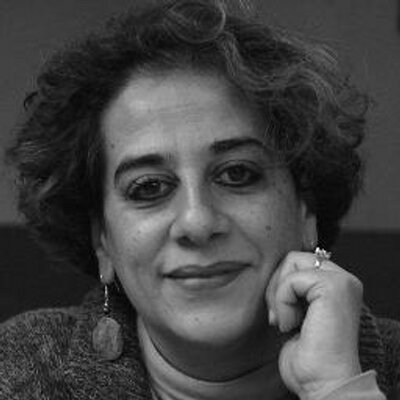 Rasna Warah writes a weekly column for the Daily Nation, Kenya’s leading newspaper. She has published five books: War Crimes (2014), Mogadishu Then and Now (2012), Red Soil and Roasted Maize (2011); Missionaries, Mercenaries and Misfits (2008) and Triple Heritage (1998). She has also written extensively about recent developments in Somalia and organized a photo exhibition on Mogadishu that was shown in Istanbul, Nairobi, Malindi and Mogadishu in 2012. Her research interests include the politics of aid, slums, urbanization, Somalia and questions surrounding identity in Kenya. www.rasnawarahbooks.com Twitter @RasnaWarah
Rasna Warah writes a weekly column for the Daily Nation, Kenya’s leading newspaper. She has published five books: War Crimes (2014), Mogadishu Then and Now (2012), Red Soil and Roasted Maize (2011); Missionaries, Mercenaries and Misfits (2008) and Triple Heritage (1998). She has also written extensively about recent developments in Somalia and organized a photo exhibition on Mogadishu that was shown in Istanbul, Nairobi, Malindi and Mogadishu in 2012. Her research interests include the politics of aid, slums, urbanization, Somalia and questions surrounding identity in Kenya. www.rasnawarahbooks.com Twitter @RasnaWarah
http://www.somaliaonline.com/while-kenyas-coast-has-been-experiencing-violent-attacks-swahili-resort-town-of-malindi-has-largely-been-spared-from-the-violence/